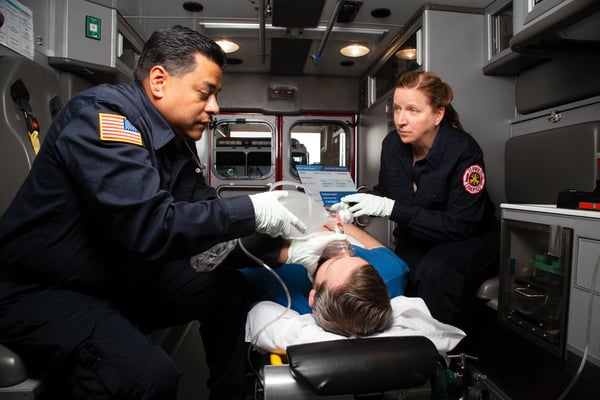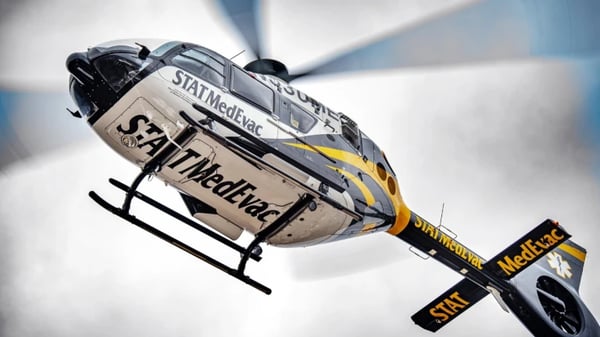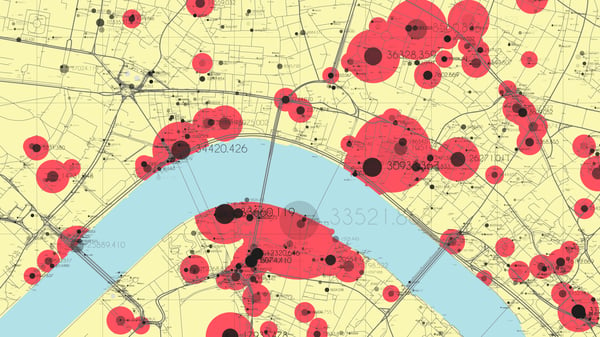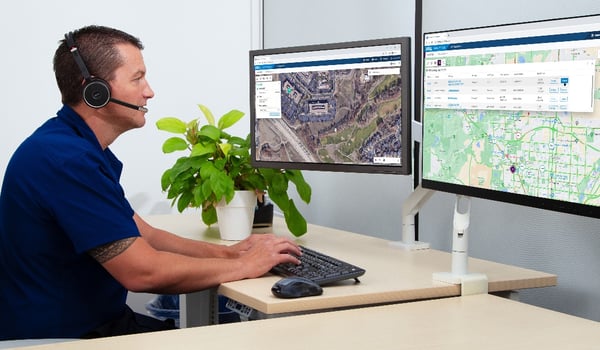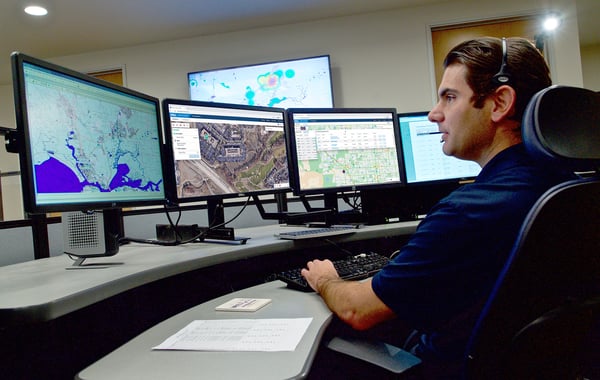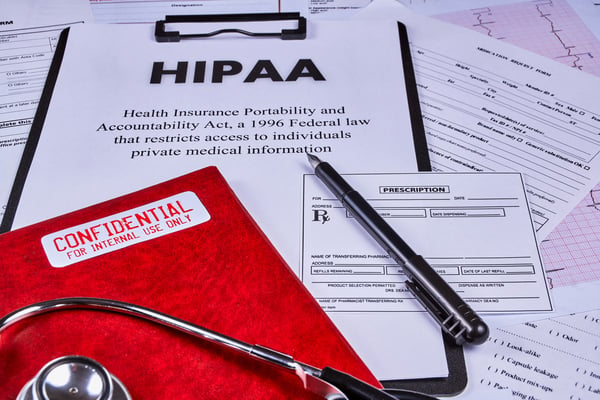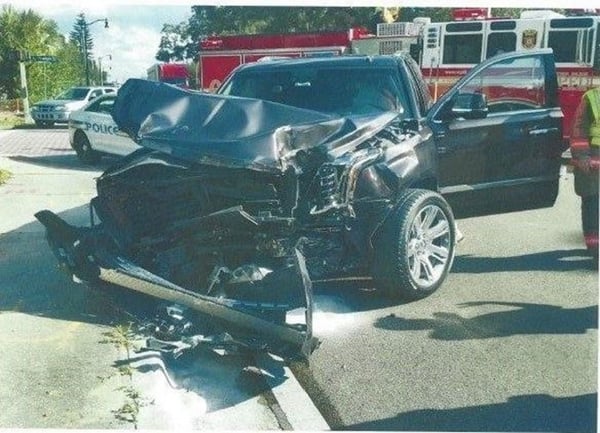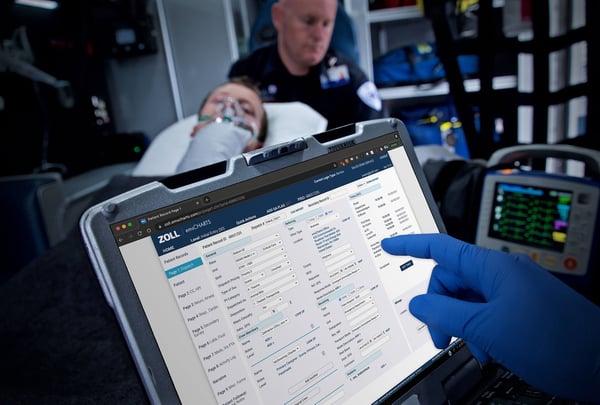News Alert: New ePCR Integration Simplifies EMS Data Management and Enables Better Care Coordination
 Mar 31, 2025
Mar 31, 2025
 2 min read
2 min read
New technology tools can be a double-edged sword in emergency medical response. On the one hand, they can enable new efficiencies and...
4 Must-have Data Points for Dispatch-Billing Alignment and Maximum Reimbursement
 Mar 27, 2025
Mar 27, 2025
 1 min read
1 min read
In emergency situations, dispatchers are responsible for guiding 9-1-1 callers through tough situations with life-saving support....
Hospitals: Here’s How To Build Partnership With EMS and Improve Performance
 Mar 20, 2025
Mar 20, 2025
 2 min read
2 min read
What happens inside an ambulance impacts patients, hospitals, and the bottom line. Over half of critically ill patients will arrive by...
How Right-day Billing With Automated Deductible Monitoring Can Increase Provider Revenue
 Feb 18, 2025
Feb 18, 2025
 1 min read
1 min read
In the good old days, most people had great, employer-sponsored healthcare plans. Patients simply provided their insurance cards at...
Maximize Revenue and Reduce Bad Debt by Monitoring Deductible Status
 Feb 4, 2025
Feb 4, 2025
 1 min read
1 min read
What was first meant to promote cash flow, “zero-day” billing has no longer become an option for many billers. As high deductible...
How STAT MedEvac Connected Device, Software, and Data Technology To Enhance QA and Elevate Care
 Feb 3, 2025
Feb 3, 2025
 1 min read
1 min read
In the 40 years since its first mission, STAT MedEvac has become one of America’s most prominent air-medical organizations, distinguished...
How Healthcare Billers Can Monitor Deductible Status To Maximize Revenue and Reduce Bad Debt
 Jan 27, 2025
Jan 27, 2025
 1 min read
1 min read
High deductible healthcare plans (HDHPs) and the self-pay patient population have grown considerably over the last few years. In 2023, over...
Podcast: 4 Ways ePCR Software Can Relieve EMS’ Biggest Headaches
 Jan 3, 2025
Jan 3, 2025
 1 min read
1 min read
The EMS industry continues to face challenges on multiple fronts. Staffing shortages persist, operational costs are rising, and reporting...
Prior Auth Denials Are Up: Here’s How To Protect Profit and Patients
 Dec 20, 2024
Dec 20, 2024
 1 min read
1 min read
The prior authorization (PA) process healthcare providers endure is a story of unintended consequences. Created as a utilization management...
How Emergency Medicine Billers Can Break the Claim Denial and Rejection Cycle
 Dec 17, 2024
Dec 17, 2024
 1 min read
1 min read
In the pressure-cooker environment of emergency medicine, providers are often operating without the staff, time, and information they need....
How EMS Agencies Can Reframe Need and Refocus Resources With Geospatial Analytics
 Dec 16, 2024
Dec 16, 2024
 3 min read
3 min read
The Emergency Medical Services (EMS) industry is facing a myriad of challenges, with most agencies under pressure to improve response times...
Podcast: 5 Ways Providers Can Improve Revenue Capture
 Dec 16, 2024
Dec 16, 2024
 1 min read
1 min read
Since 2012, the Kaiser Family Foundation reported that the average annual deductible for workers who are enrolled in their employer's...
3 Steps EMS Agencies Can Take To Prepare for the End of Virginia’s Free ePCR Services
 Dec 13, 2024
Dec 13, 2024
 2 min read
2 min read
The State of Virginia Office of Emergency Medical Services (OEMS) is ending its free ePCR services as of July 1, 2025. This means Virginia...
How To Minimize Radio Chatter and Reduce Guesswork With Smarter Dispatch Resource Management
 Dec 13, 2024
Dec 13, 2024
 2 min read
2 min read
As the hub for coordinating emergency responses for patients, the dispatch communications (“comms”) center plays an invaluable role in...
How To Spot RCM Shortcomings and Act To Improve Revenue Capture
 Nov 22, 2024
Nov 22, 2024
 1 min read
1 min read
For many — if not most — healthcare providers, collecting patient demographics, insurance information, copays, and deductibles prior to...
Black Book Research Ranks ZOLL Billing the #1 Insurance Discovery Solution
 Nov 14, 2024
Nov 14, 2024
 1 min read
1 min read
ZOLL® Data Systems has received top honors in Black Book’s annual Finance and Revenue Cycle Management survey for the second year in a row....
How Hospitals Can Improve Patient Throughput, Streamline Discharge, and Prevent Readmissions
 Nov 13, 2024
Nov 13, 2024
 1 min read
1 min read
An estimated 25-30% of total healthcare spend in the U.S. can be traced to inefficient patient throughput, delayed access to treatment,...
How an Air Medical Transport Company Broke Net Cash Collection Records With RCM Optimization Tools
 Nov 12, 2024
Nov 12, 2024
 1 min read
1 min read
When Classic Air Medical (Classic Air) looked to upgrade their billing software, they had two goals in mind: 1) restructure the billing...
How To Stop the Surge in Self-pay Write-offs by Finding Hidden Coverage You Can Bill Today
 Nov 6, 2024
Nov 6, 2024
 1 min read
1 min read
For years, healthcare providers have witnessed explosive growth in the number of patients who are self-paying or on high-deductible health...
What To Know About Insurance Eligibility, Discovery, and Verification
 Oct 29, 2024
Oct 29, 2024
 1 min read
1 min read
The healthcare industry is rife with insider acronyms and language. Take, for example, the terminology used to describe various processes...
How Practice Management Companies Can Use RCM Optimization Tools To Help Customers Get Paid Faster
 Oct 11, 2024
Oct 11, 2024
 1 min read
1 min read
As payment models shift, and the healthcare industry becomes increasingly complex, efficient revenue cycle management (RCM) practices are...
Air and Ground RCM Vendor Slashed Self-pay Volume and Increased Revenue With RCM Optimization Technology
 Oct 4, 2024
Oct 4, 2024
 1 min read
1 min read
Before Golden Hour® began using ZOLL AR Boost®, their workflows consisted of manual efforts to verify patient demographics and insurance...
What To Consider When Making the Transition From On-premises to Cloud-based EMS Software
 Sep 16, 2024
Sep 16, 2024
 1 min read
1 min read
For emergency medical service (EMS) organizations, making the jump from on-premises software to cloud-based software comes with a lot of...
Black Book Research Ranks ZOLL® AR Boost® as the #1 2024 Insurance Discovery Solution
 Aug 6, 2024
Aug 6, 2024
 1 min read
1 min read
ZOLL® Data Systems has received top honors in Black Book’s annual Finance and Revenue Cycle Management survey for the second year in a row....
Why Chase Self-pay When You Can Find and Bill Active Coverage With Help From Automated Eligibility Tools?
 Jul 16, 2024
Jul 16, 2024
 1 min read
1 min read
For years, healthcare providers have witnessed explosive growth in the number of patients who are self-pay or on high-deductible health...
How To Use Automated RCM Tools and Healthcare Market Intelligence To Power Reimbursement
 Jun 26, 2024
Jun 26, 2024
 1 min read
1 min read
In the hectic moments on scene, common obstacles arise that affect an EMS organization’s revenue cycle management (RCM) process. Some...
Using Statistical Analysis to Drive EMS Performance Improvement
 Jun 21, 2024
Jun 21, 2024
 4 min read
4 min read
You can’t manage what you don’t measure. This is true for all organizations, but the stakes are higher for EMS agencies, whose decisions...
You Can Protect Revenue Integrity: Tips for Ground and Air Ambulance Billers Navigating Medicare
 Jun 11, 2024
Jun 11, 2024
 2 min read
2 min read
Medicare can cause a lot of headaches for air and ground emergency medical service (EMS) billers. What should, in theory, be a...
How EMS Teams Can Reduce the Cognitive Workload Within the Pediatric Chain of Survival
 May 17, 2024
May 17, 2024
 1 min read
1 min read
Emergency medical service (EMS) providers play a huge role in the chain of survival for pediatric patient outcomes. Approximately 1.14...
The Time is Now: Prevent Bad Debt With Automated Deductible Monitoring and Right-day Billing
 May 8, 2024
May 8, 2024
 1 min read
1 min read
High-deductible insurance plans are continuing to grow in number, and patients often don’t meet their annual deductibles until much later...
Simple Steps Make All the Difference for Optimizing ePCRs for Billing
 May 3, 2024
May 3, 2024
 1 min read
1 min read
It’s not a rare occurrence for patient care documentation to have many holes, inaccuracies, and deficiencies that make submitting clean...
Supporting Better Operational and Financial Performance With EMS-Hospital Collaboration
 Apr 19, 2024
Apr 19, 2024
 1 min read
1 min read
A significant portion of healthcare spend can be traced to inefficient patient throughput, delayed access to treatment, and excess length...
Rescue Squad Adopts an Intuitive CAD Solution To Ramp up Dispatch and Improve Data Visualization
 Apr 3, 2024
Apr 3, 2024
 1 min read
1 min read
Princeton Rescue Squad (Princeton) was struggling with their complex, pen-and-paper process for dispatch. The manual method made data...
How EMS Agencies Can Streamline the Prior Authorization Process To Protect Revenue and Reduce Burnout
 Mar 12, 2024
Mar 12, 2024
 3 min read
3 min read
The prior authorization (PA) process emergency medical service (EMS) providers endure is a story of unintended consequences. Created as a...
Make This the Year You Optimize Accounts Receivable and Capture Maximum Revenue
 Feb 20, 2024
Feb 20, 2024
 1 min read
1 min read
A new year means new opportunities to set goals, reevaluate current workflows, and make the necessary changes to enhance your accounts...
Healthcare RCM Platform Delivers 10% More Collections for Customer Using Real-time Insurance Discovery
 Jan 31, 2024
Jan 31, 2024
 1 min read
1 min read
Inovalon, a provider of cloud-based healthcare clinical and economic solutions, wanted to help their collections agency customer (serving...
EMS-to-Hospital Handoffs Can Be a More Streamlined Experience
 Jan 25, 2024
Jan 25, 2024
 1 min read
1 min read
The transfer of care from emergency medical service (EMS) to the hospital emergency departments (ED) is often a chaotic process.i Some of...
Your Agency Isn’t Getting Paid: Here’s What You Can Do
 Jan 23, 2024
Jan 23, 2024
 1 min read
1 min read
You might be surprised at how many billing challenges are common for every agency. Issues that cause payment delays or denials are the same...
5 Ways to Achieve Revenue Integrity and Avoid Payment Delays
 Jan 5, 2024
Jan 5, 2024
 2 min read
2 min read
Revenue integrity is the goal of every billing department. If an agency can achieve this goal, its documentation will stand up to the...
Providers: Take Back Power During Payer Contract Negotiations
 Dec 19, 2023
Dec 19, 2023
 1 min read
1 min read
Covering reimbursement rates, medical necessity, credentialing, and prior authorization (PA), payer-provider contracts are key to emergency...
Meet the New ZOLL Dispatch and ZOLL Respond CAD Solution
 Dec 14, 2023
Dec 14, 2023
 1 min read
1 min read
When seconds count in emergency response, dispatchers and call takers should have the right tools in place to get critical care teams to...
Providers Can Even the Playing Field During Open Negotiations – Here’s How
 Nov 28, 2023
Nov 28, 2023
 1 min read
1 min read
Emergency medical service (EMS) providers are facing ongoing challenges when it comes to receiving the maximum reimbursement rate from...
E-Care Uses Full Cloud-based EMS Solution Suite to Streamline Operations
 Nov 15, 2023
Nov 15, 2023
 1 min read
1 min read
Based in Key Largo, Florida, E-Care Ambulance (E-Care) launched as a small, but fast-growing service offering BLS, ALS, and critical care...
Data Interoperability Drives Better Coordination of Care in Emergent Patient Transitions
 Nov 13, 2023
Nov 13, 2023
 1 min read
1 min read
Everything that happens in an ambulance has a huge impact on what happens to a patient in a hospital. Unfortunately, handoffs between...
Proactive EMS-Hospital Communication Better Prepares Providers for Faster, Safer Care
 Nov 8, 2023
Nov 8, 2023
 1 min read
1 min read
The data obtained by emergency medical technicians (EMTs) on-scene sometimes is not translated into optimal hospital care during handoffs....
News Alert: ZOLL Claims Clarity Data Service for Healthcare Providers Delivers Claims Data To Foster Market Transparency and Support Data-driven Negotiation and Decision Making
 Oct 30, 2023
Oct 30, 2023
 1 min read
1 min read
Healthcare reimbursement practices are under scrutiny, and payment levels are declining for providers from emergency medical services (EMS)...
Collect More Revenue Faster: The Pivotal Role of Clear, Concise, and Complete Documentation
 Oct 17, 2023
Oct 17, 2023
 1 min read
1 min read
Electronic patient care reports (ePCRs) should paint a vivid picture; if it is not documented, it didn’t happen! Documentation is the key...
Gain More Confidence and a Stronger Position During Open Negotiations and IDR
 Oct 10, 2023
Oct 10, 2023
 1 min read
1 min read
Since the No Surprises Act (NSA) has gone into effect, emergency medicine (EM) physicians and emergency medical service (EMS) air ambulance...
News Alert: Cloud-based, Integrated CAD Solution Helps EMS Dispatchers Respond Faster and Make Data-driven Decisions
 Sep 22, 2023
Sep 22, 2023
 2 min read
2 min read
Continuing its mission to design software and data solutions that help EMS agencies improve performance from dispatch to discharge, ZOLL®...
How One EMS Agency Cut Expenses and Improved Compliance While Spending 10% Less Time on PCRs
 Sep 18, 2023
Sep 18, 2023
 1 min read
1 min read
Monroe Ambulance’s (Monroe) providers often had challenges surrounding their patient care reports (PCRs) and wanted a morestreamlinedway to...
How the Prior Authorization Process Tests Patients, Providers, and Profits
 Aug 30, 2023
Aug 30, 2023
 1 min read
1 min read
The prior authorization (PA) process was created as a utilization management tool for insurance companies and patients. However, it has...
How Multi-company Billing Creates a New Revenue Path for EMS Agencies
 Aug 2, 2023
Aug 2, 2023
 3 min read
3 min read
For smaller EMS agencies, difficulties with billing can have a multi-faceted effect on all areas of business. Small agencies may be dealing...
How Bi-directional Data Exchange Delivers Insights That Improve the Continuum of Care
 Jul 25, 2023
Jul 25, 2023
 2 min read
2 min read
Access to comprehensive patient data throughout the continuum of care is a major interest for multiple stakeholders. Emergency department...
Mayo Clinic Ambulance Leverages Data From an Integrated Solution Suite to Improve Patient Care — ZOLL Pulse Award Winner
 Jun 29, 2023
Jun 29, 2023
 1 min read
1 min read
Mayo Clinic Ambulance (Mayo Clinic) pursued an integrated platform that would allow them to advance patient care, medicine, and service,...
St. Luke’s Emergency & Transport Services Increases Staff Productivity and Boosts Morale with Integrated Solution Suite — ZOLL Pulse Award Winner
 Jun 28, 2023
Jun 28, 2023
 1 min read
1 min read
St. Luke’s Emergency & Transport Services (SLETS) needed to meet a demand of 25,000 yearly patients accounting for 5,000 transport requests...
Virtua Improves Response Time, Reduces Spend, and Grows Their Health System — ZOLL Pulse Award Winner
 Jun 27, 2023
Jun 27, 2023
 1 min read
1 min read
With two separate, siloed counties to manage, Virtua Health Patient Logistics (Virtua) found an opportunity to better control its data and...
JFK EMS Cultivates a Culture of Quality Care Through Seamless Feedback — ZOLL Pulse Award Winner
 Jun 26, 2023
Jun 26, 2023
 1 min read
1 min read
JFK University Medical Center (JFK EMS) needed a patient documentation software solution to better support their QA/QI processes. With a...
Improve EMS Patient Satisfaction and Self-pay Balance Collections by Using a Modern Payment Platform
 May 31, 2023
May 31, 2023
 3 min read
3 min read
Patient satisfaction is a difficult puzzle for EMS providers to piece together. Medics are driven by a sincere desire to help people, but...
The Power of Data: How To Effect Positive Changes in Clinical Care
 May 19, 2023
May 19, 2023
 2 min read
2 min read
In a recent ZOLL Data Systems webinar, three clinical managers from the JFK University Medical Center (JFK EMS) in New Jersey shared their...
How Emergency Medicine Providers Can Mitigate Self-Pay Collection Challenges
 Apr 26, 2023
Apr 26, 2023
 1 min read
1 min read
Across the country, emergency medicine providers are strapped by workforce gaps and swamped by a rising tide of patient visits to the...
Tips for Making Compliance with Medicare Ground Ambulance Data Collection Requirements Easier
 Apr 20, 2023
Apr 20, 2023
 1 min read
1 min read
With reporting deadlines looming for the Medicare Ground Ambulance Data Collection System (GADCS), it’s of vital importance to understand...
Strategies and Tips for Capturing Optimal EMS Reimbursement
 Mar 31, 2023
Mar 31, 2023
 1 min read
1 min read
When EMS agencies maximize reimbursement revenue from patient transports, they help keep their organization financially strong so that they...
6 Ways to Power Up Your Clinical, Operational, and Financial Performance at ZOLL Summit 2023
 Mar 27, 2023
Mar 27, 2023
 3 min read
3 min read
ZOLL® Summit is back this June and is bigger and better than ever. As our largest and longest running educational event of the year, ZOLL...
How a Fire Department Used the New ZOLL emsCharts App to Solve Problems with Charting in the Field
 Mar 21, 2023
Mar 21, 2023
 2 min read
2 min read
Paper-based charting in the field is still the norm for EMS and Fire medics. Logging into a browser-based ePCR system simply isn’t...
Tips for Managing the Surge of Patients About To Lose Medicaid Coverage
 Feb 28, 2023
Feb 28, 2023
 1 min read
1 min read
What happens when millions of people lose healthcare coverage in one year? That’s the question healthcare providers are apprehensively...
How Our Agency Turned a COVID Crisis Into an Opportunity To Embrace Remote Dispatching
 Feb 21, 2023
Feb 21, 2023
 4 min read
4 min read
During the early days of the COVID-19 pandemic, our dispatch team was hit hard with the virus. Five dispatchers tested positive for COVID,...
Mobile Companion App Transforms the Way Medics Chart Patient Care From the Field
 Feb 17, 2023
Feb 17, 2023
 2 min read
2 min read
ZOLL® Data Systems has unveiled the latest innovation for its flagship, cloud-based ePCR software, ZOLL emsCharts.® A new mobile companion...
Proven Ways EMS Agencies Can Minimize Impact and Maximize Reimbursement From Self-pay Accounts
 Jan 27, 2023
Jan 27, 2023
 2 min read
2 min read
“Self-pay accounts are leaving EMS agencies “hanging by their fingernails.” So says Maggie Adams, President of EMS Financial Services.It’s...
How To Navigate the 2023 AMA Evaluation and Management Changes Like a Pro
 Jan 20, 2023
Jan 20, 2023
 1 min read
1 min read
Understanding recent, nuanced changes to American Medical Association (AMA) coding standards will be essential for maintaining financially...
Should Your Agency Bring EMS Billing In-house?
 Jan 16, 2023
Jan 16, 2023
 2 min read
2 min read
Is it worth it to bring your EMS billing in-house? Sooner or later, every organization that outsources its billing and collections...
5 Things You Need to Know About NEMSIS v3.5
 Jan 11, 2023
Jan 11, 2023
 2 min read
2 min read
As the new year begins, most states are preparing to, or already have, released their National EMS Information System (NEMSIS) v3.5...
EDI, AI, Robots, and Machine Learning: Demystifying Healthcare Software Automation
 Dec 20, 2022
Dec 20, 2022
 1 min read
1 min read
Facing an increasing number and complexity of claims, many healthcare organizations are hoping that software automation can provide billing...
5 Best Practices To Enhance Efficiency and Optimize Reimbursement Under CPT® E/M Coding and Guideline Changes
 Dec 16, 2022
Dec 16, 2022
 3 min read
3 min read
Along with a new year, January 1 will usher in watershed changes to the American Medical Association’s (AMA) “Current Procedure Terminology...
App Lets You Keep Charting Through the Chaos
 Dec 8, 2022
Dec 8, 2022
 4 min read
4 min read
Suited for providers’ personal devices, ZOLL® emsCharts® NOW is streamlined for contemporaneous use even when there’s no connection.
Technology Fills the Revenue Cycle Skills Gap and Enhances Financial Performance
 Nov 29, 2022
Nov 29, 2022
 1 min read
1 min read
Ambulatory surgery centers (ASCs) have had to weather multiple storms in recent years. First, when procedure volume dropped during the...
6 Steps to a Better Patient Experience Through Financial Transparency
 Oct 31, 2022
Oct 31, 2022
 3 min read
3 min read
When patients receive attention and care on the financial portion of medical care, along with quality patient care, it can reduce stress,...
CAD, Comms Center and ePCR Data Provide Critical Insights Needed to Reform EMS Processes and Protocols
 Sep 29, 2022
Sep 29, 2022
 1 min read
1 min read
The EMS industry is experiencing unprecedented challenges, including staffing shortages and unsustainable revenue models. Matt Zavadsky,...
3 Ways ASCs Can Speed Up the Prior Authorization Process
 Sep 1, 2022
Sep 1, 2022
 2 min read
2 min read
The demand for accessible, convenient outpatient procedures is growing. At the same time, ambulatory surgical centers (ASCs) are contending...
Using Data to Understand Pre-pandemic Enrollment Patterns and Protect At-risk Patients During Medicaid Redetermination
 Jul 28, 2022
Jul 28, 2022
 2 min read
2 min read
When the COVID-19 public health emergency (PHE) expires, it will be a pivotal time for providers, payers, and patients. As state Medicaid...
The Transformational Effects of Charitable Financial Screening For ASCs
 Jul 19, 2022
Jul 19, 2022
 1 min read
1 min read
Despite staffing shortages and increasing patient volumes, ambulatory surgery centers (ASCs) are still expected to provide high-quality...
Golder Ranch Fire District Increases Collections by 5% and Saves 30 Hours Per Month of Staff Time — ZOLL Pulse Award Winner
 Jun 10, 2022
Jun 10, 2022
 1 min read
1 min read
Golder Ranch Fire District (GRFD) leadership wanted to ensure that they were maximizing the functionality of RescueNet® Billing software...
City of Allentown EMS Achieves Exceptional Financial Performance and Workflow Efficiency with Move to Cloud-based Billing Software — ZOLL Pulse Award Winner
 Jun 9, 2022
Jun 9, 2022
 1 min read
1 min read
City of Allentown EMS (Allentown EMS) management had a vision for moving to a cloud-based billing solution to support the growing need to...
UMC EMS Modernizes Crew Communications, Sharpens Response Times, and Reduces Operating Costs — ZOLL Pulse Award Winner
 Jun 8, 2022
Jun 8, 2022
 1 min read
1 min read
University Medical Center’s (UMC EMS)service area has been steadily growing, and agency leadership recognized the need for a...
TransCare Improves Patient Care and Access to Wellness Services While Reducing Unnecessary 911 Calls — ZOLL Pulse Award Winner
 Jun 7, 2022
Jun 7, 2022
 1 min read
1 min read
TransCare Medical Transportation Services (TransCare), a division of the Crisis Center of Tampa Bay, has a mission “to ensure that no one...
Mutual Aid EMS Deploys New Integrated Software System to Improve Response Times, Operations, and Compliance — ZOLL Pulse Award Winner
 Jun 6, 2022
Jun 6, 2022
 1 min read
1 min read
Mutual Aid EMS operates 14 ambulance stations across a 924 square-mile service area. Agency leadership saw tremendous opportunity to...
Purpose-Built, Integrated Platforms Are the Future of Telemedicine
 Apr 26, 2022
Apr 26, 2022
 1 min read
1 min read
Telemedicine is becoming standard practice for many healthcare providers. According to Dr. David Ernst, president of telemedicine innovator...
How Medical Groups Can Tune up Front-end RCM Processes and Capture More Revenue
 Apr 22, 2022
Apr 22, 2022
 2 min read
2 min read
Medical groups are facing unprecedented cost increases as well as lost revenue that can never be recaptured. While many groups focus on...
Automated Demographic Verification Should Be Every Laboratory’s First Line of Defense Against Revenue Leakage
 Apr 12, 2022
Apr 12, 2022
 1 min read
1 min read
Many laboratories face financial challenges due to persistent downward pricing pressure, making it essential to capture payment on all...
How To Use AR Optimization and Patient Engagement Technology to Counteract ASC Staffing Shortages
 Apr 1, 2022
Apr 1, 2022
 1 min read
1 min read
The staffing crisis prompted by COVID-19 is unlikely to be resolved in the foreseeable future. When key positions can’t be filled in a...
Compliance Accreditation and Patient Safety with Pre-hospital Emergency Care
 Mar 18, 2022
Mar 18, 2022
 1 min read
1 min read
In Emergency Departments (ED) and Intensive Care Units (ICU) in the U.S., more than half of critically ill patients arrive via ambulance....
5 Simple Steps That Help You Avoid Costly Billing Mistakes, Improve Your Bottom Line, and Reduce Patient Anxiety
 Mar 3, 2022
Mar 3, 2022
 4 min read
4 min read
(7 min read) When providing healthcare services — whether that be in the pre-hospital (EMS) or traditional hospital setting — we are...
Strategies for Reducing Payment Uncertainty With Less Effort and More Satisfaction
 Feb 24, 2022
Feb 24, 2022
 2 min read
2 min read
In a recent webinar hosted by Healthcare Business Management Association (HBMA), AR optimization expert, Juli Smith, discussed the growing...
Conquering Billing Challenges Early in the Patient Encounter
 Feb 23, 2022
Feb 23, 2022
 1 min read
1 min read
Healthcare providers are striving to meet rising demand in their communities but are feeling the burden of prior authorization get heavier....
Six Reasons You Can’t Miss ZOLL Summit 2022
 Feb 22, 2022
Feb 22, 2022
 3 min read
3 min read
ZOLL’s largest educational event of the year, ZOLL Summit, brings hundreds of EMS, Fire, and healthcare professionals from all over the...
Why Rapid Access to EMS Data Is Essential for Excellence in Cardiac Systems of Care
 Feb 17, 2022
Feb 17, 2022
 5 min read
5 min read
In a cardiac system of care, STEMI-referring hospitals and STEMI-receiving centers rely on accurate, timely communication and coordination...
Demystifying Proper EMS Billing for Hospital Inpatient Transports Part 3: How Much Must the Hospital Pay?
 Feb 15, 2022
Feb 15, 2022
 1 min read
1 min read
This post is Part Three of a three-part series. View Part One | View Part Two. In part one of this three-part article series, we looked at...
Demystifying Proper EMS Billing for Hospital Inpatient Transports Part 2: Medicare Bundling Rules
 Feb 8, 2022
Feb 8, 2022
 5 min read
5 min read
This post is Part Two of a three-part series. View Part One |View Part Three. In the previous installment of this three-part article...
Demystifying Proper EMS Billing for Hospital Inpatient Transports Part 1: Who’s the Payer?
 Feb 1, 2022
Feb 1, 2022
 3 min read
3 min read
This post is Part One of a three-part series. View Part Two |View Part Three One of the areas of ambulance billing that can pose challenges...
Using ZOLL Respond for Effective Communication
 Jan 28, 2022
Jan 28, 2022
 2 min read
2 min read
Effective communication in emergency medical services provides two-way and real-time capabilities, delivering messages efficiently to and...
Billing Survival Strategies: Medicare Advantage and Medicaid Managed Care
 Jan 20, 2022
Jan 20, 2022
 1 min read
1 min read
(2 min read) As the demand for Medicare Advantage and Medicaid managed care grows, so do the rules and regulations — which means more...
Short-staffed ASCs Can Ease the Burden of Prior Authorization and Do More With Less
 Jan 18, 2022
Jan 18, 2022
 1 min read
1 min read
(2 min read) Ambulatory Surgical Centers (ASCs) do an exceptional job of collecting patient deductibles, co-pays, and other patient...
Are You Secure? Cyberattacks and Security Issues for EMS in 2021
 Jan 11, 2022
Jan 11, 2022
 3 min read
3 min read
The effects of a cyberattack on an EMS agency, software vendor, or third-party billing company can be devastating. In 2021, information is...
How and Why Bringing EMS Billing In-house Could Be Right for You
 Jan 4, 2022
Jan 4, 2022
 1 min read
1 min read
If you currently outsource your billing and collections functions and are considering bringing them in-house, you’ll want to assess whether...
Progressive Communications Centers Can Improve the Patient Experience and Transform Outdated EMS Economics
 Jan 3, 2022
Jan 3, 2022
 1 min read
1 min read
(2 min read) The current emergency medical services (EMS) economic model follows a pay-per-transport system. Insurance agencies and...
Using Mobile Devices for Connected Communication Transforms EMS Dispatch
 Dec 28, 2021
Dec 28, 2021
 4 min read
4 min read
Co-Written by Mike McKevitt, Director, Product Management
Maximize Reimbursement and Minimize Bad Debt With Deductible Monitoring Technology
 Dec 22, 2021
Dec 22, 2021
 2 min read
2 min read
(3 min read) In recent years, the healthcare industry has seen a rise in high-deductible insurance plans. In 2020 47% of covered workers...
Using Dispatch Protocols To Avoid Revenue Loss and Compliance Risk
 Nov 19, 2021
Nov 19, 2021
 3 min read
3 min read
(4 min read) Dispatch protocols are critical for complying with Medicare rules and maximizing legitimate reimbursement from the largest...
The Critical Role Communication Centers Play in the EMS Transformation
 Nov 9, 2021
Nov 9, 2021
 6 min read
6 min read
(9 min read) Once upon a time, in a land far, far away, a communications center worker answered an emergency call from a caller who relayed...
Labs of All Sizes Can Benefit From Employing Revenue-enhancing Best Practices
 Nov 8, 2021
Nov 8, 2021
 1 min read
1 min read
(2 min read) The COVID-19 lockdown caused a rapid drop-off in routine labs and specialty testing. Even those that were processing COVID...
Complete Patient Documentation Earns More Revenue and Mitigates Liability Risk
 Nov 4, 2021
Nov 4, 2021
 2 min read
2 min read
(3 min read) During the 2021 ZOLL Summit Series ePCR & Fire event, quality assurance analyst and clinical educator, Jason Haag, spoke about
Lessons Learned From EMS Documentation Legal Case Studies
 Nov 2, 2021
Nov 2, 2021
 3 min read
3 min read
(4 min read) Emergency Medical Service (EMS) documentation continues to be one of the most vexing challenges for EMS practitioners and...
Custom Reports Inform Your Quality Improvement Initiatives With Data-driven Insight
 Oct 19, 2021
Oct 19, 2021
 3 min read
3 min read
(5 min read) If you learn to leverage the custom reports function for your ePCR system, you can stay focused on critical issues while...
What Radiology Practices Need To Know About the No Surprises Act
 Oct 14, 2021
Oct 14, 2021
 2 min read
2 min read
(3 min read) Large, unexpected medical bills are increasingly at the forefront of patients' minds. Surprise billing situations occur when a...
COVID, Competition, and the Cloud Push the Industry Toward EMS 4.0
 Sep 14, 2021
Sep 14, 2021
 4 min read
4 min read
(6 min read) EMS 3.0 introduced the concept of transforming the Emergency Medical Services industry from emergency response and transport...
Artificial Intelligence, Big Data, and the Potential Revenue Cycle Win for Ambulatory Surgery Centers
 Aug 19, 2021
Aug 19, 2021
 1 min read
1 min read
(2 min read) Data science made advances toward artificial intelligence (AI) for years, which encouraged scientists to believe the dream of...
The History of NEMSIS 3.5 and How a Data-driven Industry Saves More Lives
 Aug 17, 2021
Aug 17, 2021
 3 min read
3 min read
The Evolution of NEMSIS, the National EMS Information System (3 min read) The National Highway Traffic Safety Administration (NHTSA) built...
Now Is the Time to Make the Transition to Electronic Charting
 Aug 10, 2021
Aug 10, 2021
 4 min read
4 min read
N.Y. State 2022 CME Recertification Requirements Signal Shift Toward ePCR
Data Sharing Myth: HIPAA Prevents Bi-directional Health Information Exchange
 Aug 9, 2021
Aug 9, 2021
 4 min read
4 min read
Misconceptions About HIPAA Have Created an Artificial Barrier to Bi-directional Data Sharing Between EMS and Hospitals
NEMT Market Disruption Spells Opportunity for Hospitals and EMS Agencies
 Jul 29, 2021
Jul 29, 2021
 5 min read
5 min read
(6 min read) Non-emergency medical transport (NEMT) is a growing, multi-billion-dollar industry. According to Frost & Sullivan, the total...
5 Critical Medicare Updates Every EMS Agency Should Know
 Jun 30, 2021
Jun 30, 2021
 3 min read
3 min read
(5 min read) For many years, EMS agencies and advocacy groups like the American Ambulance Associates (AAA) have been battling for adequate...
Understanding How to Get Paid by the Department of Veterans Affairs for Ambulance Transports
 Jun 24, 2021
Jun 24, 2021
 2 min read
2 min read
(3 min read) Getting reimbursement for ambulance transport from the U.S. Department of Veterans Affairs (VA) can be challenging. For...
Top 6 Tips for Optimizing EMS Reimbursement, Care Quality, and Staffing
 Jun 23, 2021
Jun 23, 2021
 3 min read
3 min read
(4 min read) Technology is transforming how the healthcare industry manages revenue, reimbursements. Claims processing is central to any...
Hold for Deductible: Why “Zero Day Billing” Is No Longer the Goal
 Jun 18, 2021
Jun 18, 2021
 2 min read
2 min read
(3 min read) The lay of the land in EMS billing used to be “Zero Day Billing.” This meant that emergency medical service (EMS) agencies...
How to Demystify Slow Revenue Capture, High Denials, and Too Many Write-offs
 Jun 17, 2021
Jun 17, 2021
 4 min read
4 min read
(6 min read) Billing for emergency medical services (EMS) is tricky in the best of circumstances. In emergent situations, patients may or...
ZOLL® Pulse Award Winner Helps Tucson Agency Increase Payments by 12%
 May 27, 2021
May 27, 2021
 3 min read
3 min read
(3 min read) The ZOLL Pulse Awards, first launched at the 2017 ZOLL Summit, recognizes professionals who improve operational efficiencies...
Hosted Computing Eases Orderly Transition to SaaS Solutions
 May 26, 2021
May 26, 2021
 4 min read
4 min read
(5 min read) There are many reasons that business applications are moving to the cloud, or Software as a Service (SaaS) model. One of the...
ZOLL® Pulse Award Winner Helps Florida Agency Achieve Higher Levels of Operational Performance
 May 21, 2021
May 21, 2021
 3 min read
3 min read
(5 min read) The ZOLL Pulse Awards, first launched at the 2017 ZOLL Summit, recognizes professionals who improve operational efficiencies...
How To Humanize Data and Empower Every Position in Your EMS Organization
 May 20, 2021
May 20, 2021
 4 min read
4 min read
(6 min read) When was the last time you heard your field-level providers talking about unit hour utilization (UHU), time on task, and other...
Spring Cleaning for Your EMS Billing
 May 14, 2021
May 14, 2021
 1 min read
1 min read
(2 min read) The COVID-19 pandemic has made it more important than ever for EMS agency billers and managers to conduct their annual reviews...
Tools and Strategies to Improve Revenue and Reduce Administrative Burden
 May 6, 2021
May 6, 2021
 1 min read
1 min read
(2 min read) “One overarching thing I think that we are struggling with today as healthcare providers is payment uncertainty. We really...
Are Your Key Performance Indicators Costing You Money? (Part 3)
 Apr 29, 2021
Apr 29, 2021
 4 min read
4 min read
Co-written by Scott A. Moore, Esq., Principal, Moore EMS Consulting LLC A Critical Look at How Common KPIs Are Being Used (or Misused) by...
Hospitals Can Improve Patient Outcomes by Using HL7 to Transform Collaboration With EMS
 Apr 28, 2021
Apr 28, 2021
 3 min read
3 min read
In the unfortunate event that you or a loved one is transported by ambulance to a hospital for emergency care, wouldn’t you want the...
The No Surprises Act: Preparing Your Practice for the Coming Challenges and Opportunities
 Apr 27, 2021
Apr 27, 2021
 2 min read
2 min read
Co-written By Juli Smith, Director, ZOLL Data Systems
Stop Relying on the Patient for Accurate and Timely Payer Information
 Apr 22, 2021
Apr 22, 2021
 2 min read
2 min read
(3 min read) When it comes to billing and revenue cycle management (RCM) services, as an industry, we have been doing the same things for...
Aggregating COVID-19 Data for a More Holistic View of the Pandemic
 Apr 20, 2021
Apr 20, 2021
 2 min read
2 min read
(3 min read) In March 2021, Greg Howard, Director of National Interoperability Sales at ZOLL Medical Corporation, and Mario Sanchez, ...
Why Healthcare Is Taking its Business to the Cloud
 Apr 15, 2021
Apr 15, 2021
 5 min read
5 min read
(7 min read) As consumers, where do you and your families interact with cloud-based software? For many consumers, it started with taxes. ...
Healthcare Credit Checks Benefit Patients and Providers Alike — So What’s the Controversy?
 Apr 12, 2021
Apr 12, 2021
 2 min read
2 min read
(4 min read) When a patient checks in to see a new healthcare provider, there is the inevitable package of new patient paperwork. Along...
5% of Your Self-pay Patients Likely Have Medicare Coverage
 Apr 8, 2021
Apr 8, 2021
 2 min read
2 min read
Gaps in demographic and insurance information are commonplace. Patients are often mislabeled as self-pay despite the presence of billable...
Retroactively Discover, Verify, and Bill Medicaid Coverage for Hospital Encounters
 Apr 5, 2021
Apr 5, 2021
 1 min read
1 min read
(2 min read) In 2019, almost 50% of all insured individuals were insured through employer sponsored plans. The COVID-19 pandemic caused the
Data Analysis Drives Better Decision Making and Increased Revenue
 Mar 15, 2021
Mar 15, 2021
 3 min read
3 min read
(5 min read) Hospitals, emergency medical services (EMS) agencies, and other healthcare providers need accurate, complete, and reliable...
The Patient’s Financial Experience: Trends, Innovations, and Challenges
 Mar 11, 2021
Mar 11, 2021
 1 min read
1 min read
Juli Forde, Director of Strategic Partnerships, AR Optimization at ZOLL® Data Systems partnered with Jonathan Wiik, Principal, Healthcare...
5 Timely EMS Billing Tips for Navigating 2021
 Feb 23, 2021
Feb 23, 2021
 4 min read
4 min read
(7 min read) Have you ever lost your glasses only to find them on top of your head? The habit of putting them there has become so routine,...
Are Your Key Performance Indicators Costing You Money? (Part 2)
 Feb 19, 2021
Feb 19, 2021
 5 min read
5 min read
Co-written by Scott A. Moore, Esq., Principal, Moore EMS Consulting LLC A Critical Look at How Common KPIs Are Being Used (or Misused) by...
Emotional Strain and Mental Health: Using ePCR Data to Transform the EMS Culture
 Jan 28, 2021
Jan 28, 2021
 4 min read
4 min read
Long shifts, low pay, and repeated, vicarious traumas are givens for paramedics and other EMS professionals. Enduring the physical and...
Implement These Best Practices for Improving Comms Center Performance
 Jan 26, 2021
Jan 26, 2021
 2 min read
2 min read
Step into any dispatch communications center, and you’ll witness a familiar buzz of activity which, to the untrained eye, can look like...
How Emergency Medicine Physicians Can Increase Revenue in 2021 With Medicare PFS Cuts Looming
 Jan 21, 2021
Jan 21, 2021
 1 min read
1 min read
In August 2020, the Centers for Medicare and Medicaid Services (CMS) released the proposed Medicare annual payment rule for 2021. This rule...
Reducing Emergency Department Days Sales Outstanding (DSO) in 2021
 Jan 19, 2021
Jan 19, 2021
 1 min read
1 min read
In 2020, emergency department volume reductions and an increase in uninsured patients have caused financial ripple effects through the...
The Cash Pay Lie and Other Costly Realities
 Jan 15, 2021
Jan 15, 2021
 1 min read
1 min read
In an effort to maintain or increase patient volume and reduce collections costs, physician groups increasingly are offering substantial...
Participating in the ET3 Model? Here’s What You Need to Know About NEMSIS Reporting Requirements
 Dec 22, 2020
Dec 22, 2020
 3 min read
3 min read
With thousands of Emergency Medical Services (EMS) agencies throughout the U.S., there are inevitably hundreds or even thousands of...
How NEMSIS v3.5.0 Can Propel the EMS Industry Forward
 Dec 21, 2020
Dec 21, 2020
 4 min read
4 min read
New National Data Reporting Elements for Improving Patient Care and Driving Evidence-based Progress in EMS’ Role in the Healthcare Ecosystem
Emergency Medicine is Facing the Imperfect Storm in 2021
 Dec 17, 2020
Dec 17, 2020
 2 min read
2 min read
The proposed Physician Fee Schedule (PFS) for 2021 increases reimbursement for office and outpatient E/M codes and thereby reduces the...
Billing Medicare and Private Payers for Telehealth Visits: What to Expect Post-Public Health Emergency
 Dec 14, 2020
Dec 14, 2020
 1 min read
1 min read
The American Medical Association (AMA) and many other organizations are actively advocating for continued support of telehealth...
Are Your Key Performance Indicators Costing You Money? (Part 1)
 Dec 9, 2020
Dec 9, 2020
 5 min read
5 min read
Co-written by Scott A. Moore, Esq., Principal, Moore EMS Consulting LLC
Using ePCR Bio-Surveillance and Geospatial Data to Improve EMS Operations
 Dec 2, 2020
Dec 2, 2020
 2 min read
2 min read
From COVID-19 hot spots to opioid overdoses, EMS agencies must evaluate community health data in new ways and more frequently than ever...
Tips for EMS Agencies to Resolve Today's Patient-Pay Accounts
 Nov 24, 2020
Nov 24, 2020
 3 min read
3 min read
Everywhere I go, ambulance providers, billing companies, and billers ask, “Why do patients think that ambulance service is free?” Across...
Data Sharing Myth: HIPAA Prevents Bi-directional Health Information Exchange
 Nov 17, 2020
Nov 17, 2020
 4 min read
4 min read
Misconceptions About HIPAA Have Created an Artificial Barrier to Bi-directional Data Sharing Between EMS and Hospitals
What’s Next? More EMS Billing in the COVID Environment
 Nov 13, 2020
Nov 13, 2020
 2 min read
2 min read
Like all other providers in the healthcare ecosystem, emergency medical services (EMS) agencies have been impacted in many ways by the...
New Perspectives Call for New EMS Practices in 2021
 Nov 2, 2020
Nov 2, 2020
 4 min read
4 min read
Undoubtedly, things have changed as a result of COVID-19. What were once accepted practices are no longer sufficient. EMS agencies must...
Now Is the Time to Make the Transition to Electronic Charting
 Oct 22, 2020
Oct 22, 2020
 4 min read
4 min read
N.Y. State 2022 CME Recertification Requirements Signal Shift Toward ePCR
How to Boost Billing Performance and Patient Satisfaction
 Oct 20, 2020
Oct 20, 2020
 4 min read
4 min read
(6 min read) Today, healthcare providers are under increased pressure to ensure a positive patient journey - one that prioritizes the ...
EMS Billing in the COVID-19 Environment
 Oct 13, 2020
Oct 13, 2020
 2 min read
2 min read
(2 min read) In April 2020,the National Association of Emergency Medical Technicians (NAEMT) conducted a survey to assess the early impact...
Offering Patient-centric Payment Plans Increases Provider Collections by More than 11%
 Oct 6, 2020
Oct 6, 2020
 1 min read
1 min read
(2 min read) Most healthcare providers report offering patient payment plans. The plans are popular; approximately half of consumers state...
Look Who’s Paying for Treatment without Transport
 Sep 22, 2020
Sep 22, 2020
 3 min read
3 min read
How Efforts at the State Level Are Blazing the Trail for Community Paramedicine Reimbursement
Leveraging Technology to Augment the EMS Billing Process and Experience
 Sep 16, 2020
Sep 16, 2020
 4 min read
4 min read
Is Now the Time to Re-engineer the EMS Billing Process?
COVID-19 Workforce Impacts and Data Collection: A Study in Collaboration
 Sep 9, 2020
Sep 9, 2020
 6 min read
6 min read
(8 min read) In early 2020, the concept of the novel coronavirus was nothing more than a whisper in New Jersey EMS agencies. It was...
Interoperability Has Come a Long Way, but There Is Much to Be Done
 Sep 3, 2020
Sep 3, 2020
 5 min read
5 min read
(8 min read) 2020 has been an interesting year, and at the time of this writing, it’s only September. I am sure the word of the year will...
4 Questions About How the COVID-19 Medical Leave Impacts EMS Agencies
 Aug 31, 2020
Aug 31, 2020
 4 min read
4 min read
(6 min read) Without a doubt, COVID-19 has presented EMS agencies with multiple challenges that collectively are some of the most...
How to Optimize Revenue Cycle Management Technology: Best Practices from the Experts
 Aug 26, 2020
Aug 26, 2020
 1 min read
1 min read
In a recent report by HIMSS Healthcare IT News, five healthcare revenue cycle technology experts offer perspectives on best practices for...
How to Verify Patient Eligibility Under the HRSA Uninsured COVID-19 Program
 Aug 13, 2020
Aug 13, 2020
 3 min read
3 min read
In early April, the U.S. Department of Health & Human Services (HHS) announced that a portion of the $100 billion CARES Act Provider Relief...
EMS Compliance Lessons from a $10M Medicare Ambulance Fraud Scheme
 Aug 11, 2020
Aug 11, 2020
 3 min read
3 min read
(4 min read) Several recent cases have shown that the Department of Health and Human Services’ Office of Inspector General (OIG) and the...
Not Your Traditional EMS Call: Documentation and Billing for Telehealth Consults
 Aug 6, 2020
Aug 6, 2020
 3 min read
3 min read
(5 min read)
Three Ways Every EMS Agency Should Be Leveraging ePCR Data
 Aug 4, 2020
Aug 4, 2020
 4 min read
4 min read
Your ePCR is a vast repository of data. So, what are you going to do with it?
Connected Communication Using Mobile Devices Transforms EMS Dispatch
 Jul 30, 2020
Jul 30, 2020
 4 min read
4 min read
Co-Written by Mike McKevitt, Director, Product Management
Leveraging Multiple Data Streams to Accelerate Reimbursement and Enable Agile Operations
 Jul 22, 2020
Jul 22, 2020
 5 min read
5 min read
(7 min read) Consider this scenario: a child enters the hospital emergency department with a broken collar bone, sustained while at play....
How EMS Providers Can Spend CARES Act Relief Funds and Prepare for an Audit
 Jul 14, 2020
Jul 14, 2020
 5 min read
5 min read
Broad HHS Guidance Covers Coronavirus Response and Lost Revenue
Mitigate the Impact of Volume Loss by Optimizing Accounts Receivable
 Jul 9, 2020
Jul 9, 2020
 3 min read
3 min read
Proven Best Practices and Solutions to Effectively Mine Past Accounts Receivable (5 min read) Amid COVID-19, hospitals and providers alike...
The National EMS Assessment: Ten Years Later
 Jul 1, 2020
Jul 1, 2020
 4 min read
4 min read
2020 NASEMSO Survey Reflects Evolution of EMS Industry
Guarding Against (More) Revenue Loss
 Jun 18, 2020
Jun 18, 2020
 3 min read
3 min read
By Maggie Adams
Improve ET3 Outcomes with Information Best Practices and Data Exchange
 Jun 16, 2020
Jun 16, 2020
 5 min read
5 min read
Innovating Revenue Streams During COVID-19: Four Telehealth Best Practices
 Jun 4, 2020
Jun 4, 2020
 2 min read
2 min read
Written By: Juli Forde (3 min read) As healthcare providers continue to manage unprecedented challenges during the COVID-19 crisis, making...
How to Prevent Revenue Loss During COVID-19
 May 21, 2020
May 21, 2020
 3 min read
3 min read
Unanticipated situations like the COVID-19 crisis present significant revenue challenges for healthcare providers. The path forward can be...
How to Minimize the Operational Impact of MBI and Increase Patient Satisfaction
 May 13, 2020
May 13, 2020
 3 min read
3 min read
3 Reasons Cloud-Based Solutions Make Good Sense for Fire & EMS
 Apr 9, 2020
Apr 9, 2020
 2 min read
2 min read
Data security is on everyone’s mind in this age of cyber criminals, malware, and ransomware. Nowhere is this truer than in the healthcare...
4 Tips for Maximizing Billing During the COVID-19 Pandemic
 Mar 26, 2020
Mar 26, 2020
 2 min read
2 min read
(3 min read) Using your software tools to maximize billing efforts during these difficult times may not be top of mind right now, but I...
COVID-19 Patient Documentation to Improve Outcomes and Protect EMS Crews
 Mar 13, 2020
Mar 13, 2020
 1 min read
1 min read
With COVID-19 cases on the rise, first responders must address a new set of concerns relating to patient care and crew safety. The CDC has...
Three Metrics Guiding Progressive Change within EMS
 Mar 11, 2020
Mar 11, 2020
 4 min read
4 min read
A look at where we’ve used data in the past and how we’re using it now to improve performance in the prehospital and in-hospital settings.
Four Actionable Takeaways from the First Ambulance HIPAA Settlement
 Mar 5, 2020
Mar 5, 2020
 1 min read
1 min read
Written By: Ryan Stark
Three Ways for Billing Departments to Handle Financial Hardships
 Feb 19, 2020
Feb 19, 2020
 2 min read
2 min read
Written by: Maggie Adams (3 min read) Self-pay accounts are an ongoing frustration for billing departments. The best billing system can’t...
Five EMS Technology Improvements that Will Shape the Next Ten Years
 Feb 13, 2020
Feb 13, 2020
 2 min read
2 min read
“The only constant is change,” paraphrasing the ancient Greek philosopher, Heraclitus. In the world of technological and engineering...
Medicare Beneficiary Identifiers Accelerate Claim Payment
 Feb 11, 2020
Feb 11, 2020
 3 min read
3 min read
(4 min read) On January 1, 2020, the Centers for Medicare and Medicaid Services (CMS) made the formal shift to the use of Medicare...
Being Paid vs. Being Paid Correctly: The Difference Can Be Costly
 Feb 5, 2020
Feb 5, 2020
 2 min read
2 min read
(4 min read) It’s no secret that being paid for the service you provide is the goal for most ambulance systems. After all, reimbursement is...
5 Blogs from SUMMIT 2019 Speakers to Help Get You Pumped for SUMMIT 2020
 Jan 29, 2020
Jan 29, 2020
 2 min read
2 min read
(3 min read) We had a fantastic lineup of speakers at SUMMIT 2019. While we get ready to announce our speakers for 2020, we wanted to look...
The Never Quite Forgotten Compliance Risk
 Jan 22, 2020
Jan 22, 2020
 3 min read
3 min read
(6 min read) Medicare usually pays the largest portion of ambulance claims. But when viewing medical transportation - ambulance combined...
ROI from CQI
 Jan 15, 2020
Jan 15, 2020
 2 min read
2 min read
(4 min read) CQI involves more than just checking reports to make sure that the “red” went away, it’s a continuous process focusing on...
Time Check on Your Company's Best Practices
 Jan 9, 2020
Jan 9, 2020
 3 min read
3 min read
(4 min read) As we head into 2020, it is a good time to get a check-up. I’m not talking about a trip to your doctor, I’m suggesting a...
Spotlight on SUMMIT 2020’s Keynote Lineup
 Jan 7, 2020
Jan 7, 2020
 2 min read
2 min read
ZOLL is excited to announce our keynote speaker lineup for SUMMIT 2020! The three-day event, scheduled for June 9-11 at the Sheraton in...
6 Simple Cybersecurity Tips for EMS Agencies
 Dec 11, 2019
Dec 11, 2019
 1 min read
1 min read
(2 min read) EMS agencies are very attractive targets for cybercriminals. But, there are easy steps you can take to better protect your...
Mobile “Interoperable” Healthcare: An Alternative Definition to “MIH”
 Dec 4, 2019
Dec 4, 2019
 3 min read
3 min read
We’re used to hearing about ‘interoperability’ in terms of communications, but how about its use in information exchange?
Response Times: We Did it to Ourselves (And Now We Need to Change It)!
 Nov 13, 2019
Nov 13, 2019
 3 min read
3 min read
What response times can tell us (if we gather the data accurately) (5 min read) Nine minutes or less, 90% of the time – or whatever...
Achieving Revenue (Tri)Cycle; Not (Uni)Cycle
 Nov 6, 2019
Nov 6, 2019
 2 min read
2 min read
(3 min read) When people hear the phrase “revenue cycle,” words like "billing," "collections," and "payment" typically come to mind. While...
Accounts Receivable (A/R) Management: Working With Patients and Third-Party Payers
 Oct 31, 2019
Oct 31, 2019
 5 min read
5 min read
(7 min read) The most common question I get is, “Why do our accounts receivable keep growing?” Problems with unpaid claims, denied...
Train Your New Gal (and Old Guy) on Documentation
 Oct 29, 2019
Oct 29, 2019
 3 min read
3 min read
(5 Min Read) Let's face it, a one hour of discussion about threatening lawsuits or a courtroom credibility shredding during someone's...
5 Ways to Empower Millennials in the EMS Workforce
 Oct 22, 2019
Oct 22, 2019
 4 min read
4 min read
(6 min read) Co-Written by Logan Sullivan and Rabecca Sembrat We continue to see research showing that Millennials are the most educated...
How Using Dispatch Protocols Can Avoid Revenue Loss and Compliance Risk
 Oct 16, 2019
Oct 16, 2019
 3 min read
3 min read
(4 min read) Dispatch is an area that seems to generate a lot of misunderstandings and confusion, especially as it relates to Medicare...
Using Audit Results and Your Data to Improve Compliance
 Oct 9, 2019
Oct 9, 2019
 3 min read
3 min read
Audits sometimes get the reputation of being a bad thing or a dirty word. But an audit, whether you’re doing it yourself, hiring someone to...
EMS and Fire: Unique Challenges and Solutions
 Sep 25, 2019
Sep 25, 2019
 4 min read
4 min read
How Chris Davison of Tucson Fire tackles challenges and optimizes for efficiency (6 min read) Chris Davison has been the Ambulance Billing...
Risk Management: Beyond ‘Checking the Box’
 Aug 29, 2019
Aug 29, 2019
 3 min read
3 min read
(4 min read) EMS workers carry heavy responsibility time and time again—on a daily basis. Every mile of ambulance operations, their eyes...
The EMS Provider Wellness Puzzle
 Aug 14, 2019
Aug 14, 2019
 5 min read
5 min read
Fitting the pieces together for an overall picture of health (7 min read) Over the past few years, the focus of EMS research, best...
Automate these processes to save yourself time in EMS
 Jul 30, 2019
Jul 30, 2019
 3 min read
3 min read
(4 min read) He fires the flaming arrow into the void of darkness inside the cave before him. Hercules was not generally considered a weak...
ePCR Can Make or Break You
 Jul 25, 2019
Jul 25, 2019
 3 min read
3 min read
(4 min read) At this year’s ZOLL Summit conference, I presented a session on the pros and cons of e-pcr systems. This session covered...
Lessons from EMS HIPAA Audits: 5 Violations We See at (Almost) Every Agency
 Jul 23, 2019
Jul 23, 2019
 3 min read
3 min read
(5 min read) Our firm has been doing on-site HIPAA audits for over 15 years now and one of the most popular questions we get is: “What are...
Changing EMS Leadership into Lionship
 Jul 18, 2019
Jul 18, 2019
 5 min read
5 min read
(6 min read) Take a moment and reflect on two very fundamental questions you should ask yourself as a leader in EMS. First, why did you get...
Defining and enforcing accountability in EMS
 Jul 16, 2019
Jul 16, 2019
 4 min read
4 min read
(6 min read) A few months back I was assisting an organization in their efforts to increase employee engagement and satisfaction. A dirty...
10 Strategies to Avoid Budget-Busting Fines Related to Business Associate Agreements
 Jul 10, 2019
Jul 10, 2019
 3 min read
3 min read
(4 min read) Got room in your budget to pay off a $750,000 settlement simply for not having an up-to-date Business Associate Agreement...
Re-framing Airway Management
 Jul 8, 2019
Jul 8, 2019
 4 min read
4 min read
(6 min read) As pre-hospital providers airway management (basic or advanced) should be our bread and butter. After all, our lives and very...
Will After-Market Alterations Leave You Feeling Sheepish?
 Jul 2, 2019
Jul 2, 2019
 2 min read
2 min read
(3 min read) The sheep-skin strap covers may “look cute and seem soft”, but a Georgia mother now cautions the use of aftermarket products...
5 Ways to be “Better Than Yesterday”
 Jun 26, 2019
Jun 26, 2019
 3 min read
3 min read
(3 min read) EMS is an evolving profession. We are constantly changing our practices and procedures to meet the demands of an ever-changing...
I’ll Sleep When I’m Dead: Sleep Loss and Fatigue in EMS
 Jun 20, 2019
Jun 20, 2019
 3 min read
3 min read
(4 min read) When I was a new EMT all I wanted to do was work on the ambulance answering calls with my friends. So much so that I had three...
Using ZOLL X-series, Case Review and Sidewalk CPR to double ROSC rates
 Jun 18, 2019
Jun 18, 2019
 3 min read
3 min read
(5 min read) After attending King County Resuscitation Academy, Cosumnes Fire started to use the data provided by the ZOLL X series and...
Can CISD Heal a Culture?
 Jun 14, 2019
Jun 14, 2019
 3 min read
3 min read
(5 min read) There is no debating the fact that responder PTSD and suicide has become an epidemic. It seems we cannot visit any of the...
Expert Data Analysis & Reporting Improved Operational Performance and Patient Care
 Jun 14, 2019
Jun 14, 2019
 3 min read
3 min read
(4 min read) Steve Myers has been with Mobile Medical Reponse (MMR) for 23 years. He’s the resident Crystal Reports expert in the company,...
MISSION: INTEROPERABILITY: PART 2
 Jun 12, 2019
Jun 12, 2019
 3 min read
3 min read
(4 min read) Part 2. If you missed Part 1, you can read it here.
Award-winning Cardiac Arrest Resuscitation Program: “Race to the Top”
 Jun 10, 2019
Jun 10, 2019
 4 min read
4 min read
(5 min read) Lauren Emanuelson has been with Advanced Medical Transport for 10 years. She manages the “Race to the Top” Program, focused on...
Superior Revenue Recapture, Streamlined Processes and Innovative Problem-Solving
 Jun 7, 2019
Jun 7, 2019
 2 min read
2 min read
(3 min read) Julie Mickow has been with the Mayo Clinic for 22 years. In her time there, she has held every role in the revenue stream and...
Do Your Own Internal Audit to Avoid External Review (and Reduce Denials)
 Jun 5, 2019
Jun 5, 2019
 4 min read
4 min read
(5 min read) Lately it feels like ambulance providers are getting yelled at from Medicare and the OIG at every turn – “Medicare Paid Twice...
Improving Clinical Care, Operational Efficiency and Saving Lives with Data
 Jun 3, 2019
Jun 3, 2019
 3 min read
3 min read
(4 min read) Mark Weade has been with the Upper Arlington Fire Division for 10 years. He has made great strides in analyzing their EMS data...
Implementing a Single Source Solution to Support Growth, Clinical Care and Disaster Response
 May 31, 2019
May 31, 2019
 2 min read
2 min read
(3 min read) Corey Martin has been with MedTrust for 3 years. As Director of Innovative Practices, Corey went the extra mile in improving...
MISSION: INTEROPERABILITY: PART 1
 May 29, 2019
May 29, 2019
 3 min read
3 min read
(5 min read) What if I were to tell you there is a pill you can prescribe to prevent death related to sudden cardiac and stroke?
Improved Targeted Care for High-Volume Users while Decreasing Ambulance Transports
 May 27, 2019
May 27, 2019
 2 min read
2 min read
(3 min read) Together, Erich Scheunemann and Michael Riley, who both work for the Anchorage Fire Department, achieved impressive results by...
Designing innovative ways to improve operations, streamline processes and deliver a higher level of care
 May 23, 2019
May 23, 2019
 2 min read
2 min read
(3 min read) Robert Morgan has been with Lifeguard Ambulance for 9 years, providing strong leadership in overall operations. Lifeguard...
Stabilizing and Increasing Cashflows to Meet Financial and Operational Objectives
 May 21, 2019
May 21, 2019
 2 min read
2 min read
(3 min read) Jeff Greenway has been with Thorne Ambulance Service for 7 years. He has been instrumental in their implementation and early...
ZOLL Pulse Awards 2019: Celebrating our Exceptional EMS Practitioners
 May 17, 2019
May 17, 2019
 3 min read
3 min read
Another successful SUMMIT on the books! As we reflect on the events of the last week, once again the team at ZOLL would like to...
First Responders: At the Forefront of Disaster & PTSD
 May 15, 2019
May 15, 2019
 4 min read
4 min read
Recognize Post-Traumatic Stress Disorder signs and symptoms to better protect your crew members (5 min read) If you’ve missed the...
How Health Care Fits into the Internet of Things
 May 1, 2019
May 1, 2019
 4 min read
4 min read
What is the Internet of things? For starters, the “Internet of things” represents the fact that everything you own can (and will...
Prevent Fire & EMS burnout with 3 key tactics
 Apr 24, 2019
Apr 24, 2019
 4 min read
4 min read
How to better recognize personnel burnout symptoms and proactively protect your crew against them (6 min read) Emergency responders face...
In-Premise or Cloud Software for EMS
 Apr 19, 2019
Apr 19, 2019
 7 min read
7 min read
(8 min read) Vendors are quick to tell you that cloud-based applications that provide Software-as-a-Service (SaaS) products are faster to...
Staying Fit for Duty in EMS
 Apr 17, 2019
Apr 17, 2019
 3 min read
3 min read
ZOLL SUMMIT Speaker Series As a profession, we are in a crisis. A first responder commits suicide every 4 days in the United States. The...
5 Reasons We Need to Talk about PTSD in EMS & Fire
 Apr 11, 2019
Apr 11, 2019
 3 min read
3 min read
A recent study by EMS1 found that provider mental health was ranked as the most significant issue facing EMS by 52-67% of respondents in...
Behind the Scenes with Anthony Guerne
 Apr 9, 2019
Apr 9, 2019
 4 min read
4 min read
ZOLL SUMMIT Speaker Series PTSD Panel Discussion - A View From Different Perspectives
ZOLL SUMMIT Keynote Speaker Series: Behind the Scenes with Jim Marshall
 Apr 4, 2019
Apr 4, 2019
 4 min read
4 min read
A Trauma Therapist’s Life-Saving & Ridiculously Hopeful Perspective for EMS Pros Jim Marshall is widely regarded as the 911 industry's...
5 Obstacles to EMS and Hospital Interoperability
 Apr 2, 2019
Apr 2, 2019
 3 min read
3 min read
As we’ve discussed in earlier posts (What Does Integration into the Healthcare System Look Like for EMS?) realizing the Triple Aim goals of...
New Rules: How Will the New CMS/ONC Interoperability Rules Impact EMS?
 Mar 28, 2019
Mar 28, 2019
 3 min read
3 min read
There is a federal agency that promotes, monitors, and maintains the implementation of electronic health records within the US. It is the...
EMS Agenda 2050: Leading Us into an Evidence-Based, Data Driven Future
 Mar 26, 2019
Mar 26, 2019
 3 min read
3 min read
Creating the Future
Delivering good medicine in bad places: Starting Canada’s first PHARM Service
 Mar 21, 2019
Mar 21, 2019
 3 min read
3 min read
ZOLL SUMMIT Speaker Series She was 24-years-old, in hypothermic cardiac arrest with immediate bystander CPR. But no ambulance was coming....
Finding the Right Revenue Cycle Management Vendor
 Mar 18, 2019
Mar 18, 2019
 3 min read
3 min read
Capturing, managing and collecting revenue is a fundamental aspect of being in business, even if your business is to serve the public. One...
The Emergency Triage, Treat, and Transport Model (ET3)
 Mar 14, 2019
Mar 14, 2019
 5 min read
5 min read
CMMI’s new pilot program ushers Medicare into the 21st Century “When you only get paid if you take people to the hospital, guess what...
Is Your Leadership Style Enhancing Team Spirit?
 Mar 12, 2019
Mar 12, 2019
 3 min read
3 min read
ZOLL SUMMIT Speaker Series Anyone who has ever worked shift work knows that some shifts are better than others. Many times, the experience...
The Key Skill Missing in EMS A-B-C Techniques
 Mar 7, 2019
Mar 7, 2019
 7 min read
7 min read
Whether you use A-B-C or C-A-B (2010 proposed AHA Guidelines for adult BLS), the outstanding technical skills of first responders (EMTs,...
Prescription CPR
 Mar 5, 2019
Mar 5, 2019
 3 min read
3 min read
ZOLL SUMMIT Speaker Series Advanced Cardiac Life Support was first published by the American Heart Association in 1974. Despite 45 years of...
EMS and Hospital Collaboration
 Mar 1, 2019
Mar 1, 2019
 4 min read
4 min read
ZOLL SUMMIT Speaker Series Question: As an EMS professional how would you rate the transition of care and flow of information from the...
Resuscitate Your EMS Billing Office
 Feb 27, 2019
Feb 27, 2019
 4 min read
4 min read
Are You Overlooking the Human Aspects of Your Billing Office? In EMS, we are all acutely aware of the compliance risks our industry faces....
Improving Advanced Cardiac Life Support in EMS
 Feb 21, 2019
Feb 21, 2019
 2 min read
2 min read
ZOLL SUMMIT Speaker Series It all starts with questioning yourself. Our first challenge: identifying what really has an impact on the care...
Improving EMS Documentation Outcomes
 Feb 19, 2019
Feb 19, 2019
 3 min read
3 min read
ZOLL SUMMIT Speaker Series Think of the phrase “EMS documentation.” What comes to mind?
Listen to Your Heart: Improving ROSC Rates in EMS
 Feb 14, 2019
Feb 14, 2019
 4 min read
4 min read
Stories of Survival, Inspiration and Innovation for Heart Month In the past year, ZOLL has hosted several “Outcomes Academy Bootcamps” to...
A beginner’s guide to using EMS data to measure performance
 Feb 12, 2019
Feb 12, 2019
 3 min read
3 min read
ZOLL SUMMIT Speaker Series Let’s put it right out there…data is everywhere! Business and professionals across the globe have gone data...
It’s Heart Month: Top-Level Heart Health Tips for Emergency Responders
 Feb 6, 2019
Feb 6, 2019
 3 min read
3 min read
Help your heart stay in shape with these simple and proactive techniques You work in an industry where you regularly exert both your body...
Undertaking Clinical Trials in a Pre-Hospital Setting
 Feb 4, 2019
Feb 4, 2019
 3 min read
3 min read
ZOLL SUMMIT Speaker Series As a supervisor of Education, Research and Community Programs for Peel Regional Paramedic Services, I provide...
EMS and Healthcare in 2019: A Glimpse into the Future
 Jan 31, 2019
Jan 31, 2019
 2 min read
2 min read
I hope everyone had a great holiday season and a positive start in this new year.
New Year New CEUs: Top 5 Educational Opportunities at SUMMIT 2019
 Jan 29, 2019
Jan 29, 2019
 3 min read
3 min read
“Learning is not attained by chance, it must be sought for with ardor and attended to with diligence.” – Abigail Adams Every year when we...
Community Paramedicine in 2019: Design, Sustainability, and the Future
 Jan 24, 2019
Jan 24, 2019
 3 min read
3 min read
ZOLL SUMMIT Speaker Series Community Paramedicine. It is a concept/model we have been hearing about for years, and it is one of the top...
EMS Narratives: Telling the story for others to read
 Jan 22, 2019
Jan 22, 2019
 3 min read
3 min read
Documentation It’s arguably one of the least desirable aspects of being an EMS provider (at least in the eyes of many). It’s also one of...
Leverage the Cloud for Better EMS Data Management
 Jan 17, 2019
Jan 17, 2019
 5 min read
5 min read
Earlier this year, ZOLL hosted a webinar on Operationalizing Data. After the webinar, we asked attendees to share what, if anything, their...
A quick guide to tracking and managing clinical data better in 2019
 Jan 15, 2019
Jan 15, 2019
 3 min read
3 min read
Earlier this year, ZOLL hosted a webinar on Operationalizing Data. After the webinar, we asked attendees to share what, if anything, their...
Collecting, Analyzing and Implementing EMS Billing KPI Data
 Jan 10, 2019
Jan 10, 2019
 4 min read
4 min read
Tracking Metrics in Billing Agencies Earlier this year, ZOLL hosted a webinar on Operationalizing Data. After the webinar, we asked...
Level-up Your ePCR Data Collection and Implementation
 Jan 8, 2019
Jan 8, 2019
 4 min read
4 min read
Earlier this year, ZOLL hosted a webinar on Operationalizing Data. After the webinar, we asked attendees to share what, if anything, their...
EMS Dispatch Data: Why measure it and how to do it better in 2019
 Jan 4, 2019
Jan 4, 2019
 3 min read
3 min read
(4 minute read) Earlier this year, ZOLL hosted a webinar on Operationalizing Data. After the webinar, we asked attendees to share what, if...
2018 EMS in Review
 Jan 1, 2019
Jan 1, 2019
 4 min read
4 min read
(6 minute read) There is never a year that is more interesting than the last, at least from my perspective. Some things come to pass,...
2018 EMS Mobile App Round-up
 Dec 27, 2018
Dec 27, 2018
 2 min read
2 min read
It’s that time of year again when I sleuth around the internet and comb through user-reviews to compile the most useful smartphone apps for...
Get Better at Collecting, Analyzing and Actioning Your EMS Data in 2019
 Dec 20, 2018
Dec 20, 2018
 3 min read
3 min read
(4 minute read)
2018 EMS in Review
 Dec 19, 2018
Dec 19, 2018
 4 min read
4 min read
(6 minute read) There is never a year that is more interesting than the last, at least from my perspective. Some things come to pass,...
Emergent Response, a Dangerous Epidemic
 Dec 13, 2018
Dec 13, 2018
 3 min read
3 min read
Why Using Lights & Sirens Can Be Risky Business In one of our recent webinars, McGowan discussed the dangers of emergent response. When...
ZOLL SUMMIT Keynote Speaker Series: Behind the Scenes with Jan Rader
 Dec 11, 2018
Dec 11, 2018
 2 min read
2 min read
ZOLL SUMMIT Keynote Speaker Series: Behind the Scenes with Jan Rader “Fire chief Jan Rader has spent her career running toward fires and...
ZOLL SUMMIT Keynote Speaker Series: Behind the Scenes with Matt Havens
 Dec 6, 2018
Dec 6, 2018
 4 min read
4 min read
Stop Acting Your Age! a Unique Keynote on Generational Leadership If you’ve listened to discussions about generational issues at work, then...
HIPAA, Privacy, and You - Understanding The Protection of Patient Data
 Dec 4, 2018
Dec 4, 2018
 2 min read
2 min read
Whether you’re a healthcare provider or simply work with them, you have an obligation to protect the information of your patients - and...
5 Guidelines for Fatigue Risk Management
 Nov 29, 2018
Nov 29, 2018
 4 min read
4 min read
During a recent ZOLL webinar on EMS fatigue, the audience was asked whether fatigue was a problem in their organization. An astounding 79...
Behind the Scenes with a Beta Customer
 Nov 27, 2018
Nov 27, 2018
 3 min read
3 min read
CareMed gets in on the ground floor with ZOLL Billing Note: ZOLL Billing is now widely available in market. To learn more about getting...
Why Your EMS Agency Should Be Tracking Financial & Operational Metrics
 Nov 20, 2018
Nov 20, 2018
 3 min read
3 min read
It’s imperative that the industry begins to collect accurate data now, as it will be used to direct future reimbursement decisions. Are you...
Emergency Response Travel Safety
 Nov 15, 2018
Nov 15, 2018
 1 min read
1 min read
Important Initiatives for Traveling Emergency Responders by Jerome Ozog, Glatfelter Program Managers & ETC Education Specialist
The Most Important Metrics Your Agency Should Be Measuring
 Nov 13, 2018
Nov 13, 2018
 3 min read
3 min read
“Data is a great four-letter word, but operationalizing it or turning it into actionable intelligence is a key activity for any executive...
Webinar Recap: RescueNet ePCR 6.5—New Features!
 Nov 8, 2018
Nov 8, 2018
 1 min read
1 min read
On October 22nd ZOLL released RescueNet ePCR 6.5. With a whole myriad of exciting new features to explore, we invited ZOLL Product Owner...
Webinar Recap: After 1 Year with Billing Pro, Payments Are Up 116%
 Nov 6, 2018
Nov 6, 2018
 3 min read
3 min read
In a recent webinar Ryan Thorne, owner and CEO of Thorne Ambulance Services, discussed the success his company experienced after...
The Challenge of Counting Costs
 Nov 1, 2018
Nov 1, 2018
 3 min read
3 min read
In EMS, our reimbursement doesn’t cover our costs.
6 Reasons You Can’t Miss SUMMIT 2019
 Oct 30, 2018
Oct 30, 2018
 2 min read
2 min read
ZOLL SUMMIT is ZOLL’s largest educational event of the year that brings together hundreds of EMS and fire professionals from all over the...
Aviation Webinar Discusses Safety and Crew Resource Management
 Oct 11, 2018
Oct 11, 2018
 2 min read
2 min read
A recent webinar featured experienced pilots Captain Dick Blanchet, Major Ben Blanchet, and Captain Chris Guerra as panelists as well as...
How to Provide 5-Star Patient Transport
 Oct 9, 2018
Oct 9, 2018
 2 min read
2 min read
Could your ambulance and paratransit customer service rival Uber? In a 2015 Jimmy Kimmel Live television skit, Kimmel compared an ambulance...
Ambulance Billing for Small and Medium Services – Outsource or Keep In-House?
 Oct 4, 2018
Oct 4, 2018
 4 min read
4 min read
Maggie Adams, president of EMS financial services recently presented a webinar on the topic of ambulance billing—is it better to keep your...
Hospital Patient Transfers with Optional Protocols!
 Oct 2, 2018
Oct 2, 2018
 2 min read
2 min read
Patient Transfers are business. Serious business for all patients involved; transferring hospitals, transport service, agent and – the...
EMS Operations, Documentation & Billing
 Sep 27, 2018
Sep 27, 2018
 4 min read
4 min read
It's all about the numbers Welcome to 2018, a year of numbers that will influence operations, billing, documentation and compliance....
Advancing the Continuum of Care
 Sep 25, 2018
Sep 25, 2018
 4 min read
4 min read
The Time to Become Step 1 in Your Community’s Continuum of Care is Now Too often in our pursuit of a “smart system” on which to base our...
The Importance of Documentation Compliance
 Sep 20, 2018
Sep 20, 2018
 4 min read
4 min read
What is the quickest way to get EMTs and paramedics to roll their eyes? Tell them how important their documentation is to reimbursement,...
The 7 Deadly Sins of EMS Billing
 Sep 18, 2018
Sep 18, 2018
 5 min read
5 min read
In September 2015, the Department of Health and Human Services Office of the Inspector General (OIG) issued a report, “Inappropriate...
3 Ways to Improve Your EMS Billing Management
 Sep 13, 2018
Sep 13, 2018
 4 min read
4 min read
Today we discuss the many small steps ambulance providers can take to improve operations and get paid for transports. Actions in dispatch,...
Operational Dashboards: Using Your EMS Data to Improve Operations
 Sep 6, 2018
Sep 6, 2018
 3 min read
3 min read
Last month, we shared six dashboards to improve clinical outcomes. This month, as we focus on operational efficiency, we delve into how...
Auditing Ambulance Claims
 Sep 4, 2018
Sep 4, 2018
 3 min read
3 min read
Why, How, and When During recent client audits, we found an insurer who had underpaid two clients. Naturally, the clients were thrilled to...
Four Free eLearning Courses on Ambulance Safety
 Aug 30, 2018
Aug 30, 2018
 3 min read
3 min read
Is ambulance safety a concern or focal point in your organization? We fully support that! ZOLL is committed to improving ambulance safety...
Why Do Ambulance Claims Get Denied
 Aug 23, 2018
Aug 23, 2018
 2 min read
2 min read
Paint a Complete Patient Story to Eliminate Denied Claims Your crews’ patient care reports (PCRs) should clearly and consistently...
Is it more cost effective to outsource your EMS billing or do it in-house?
 Aug 21, 2018
Aug 21, 2018
 4 min read
4 min read
Choosing the Right System: EMS Platforms, Operations, Software
 Aug 16, 2018
Aug 16, 2018
 1 min read
1 min read
EMS is at a pivotal and impactful time period in its historical timeline. It used to be, the tones go off…you respond to the call…you...
How to Keep Your EMS Agency HIPAA Compliant
 Aug 14, 2018
Aug 14, 2018
 2 min read
2 min read
In 2016, the Heath Insurance Portability and Accountability Act (HIPAA) police levied far more penalties than ever before, and government...
7 Questionable EMS Billing Practices to Avoid
 Aug 9, 2018
Aug 9, 2018
 5 min read
5 min read
In September 2015, the Department of Health and Human Services Office of the Inspector General (OIG) issued a report, “Inappropriate...
5 Steps to Finding the Right EMS Billing Software Provider
 Aug 7, 2018
Aug 7, 2018
 1 min read
1 min read
Are you in the process of bringing your EMS billing in house? Unless you plan on billing manually, the selection of your software provider...
Why is EMS Documentation the Dreaded Part of the Job?
 Aug 2, 2018
Aug 2, 2018
 4 min read
4 min read
You’re at your station, just getting ready to sit down on the recliner and kick your feet up when the tones drop “Medic 4, respond to a...
July Roundup: The Integration of EMS into Healthcare for Better Patient Outcomes
 Jul 31, 2018
Jul 31, 2018
 2 min read
2 min read
True integration and interoperability requires coordination and communication between EMS and its healthcare systems. The following is a...
Want to Get Paid? Ensure Field Crews Complete Compliant Trip Reports
 Jul 26, 2018
Jul 26, 2018
 4 min read
4 min read
What is the quickest way to get EMTs and paramedics to roll their eyes? Tell them how important their documentation is to reimbursement,...
Track These 7 KPIs to Improve EMS Billing Efficiency
 Jul 24, 2018
Jul 24, 2018
 2 min read
2 min read
As an ambulance billing department, it’s important that you identify key performance indicators (KPIs) to evaluate agency performance and...
How to Use ePCR Data to Build Relationships with Hospital Partners
 Jul 19, 2018
Jul 19, 2018
 2 min read
2 min read
EMS is driven to respond to patients in need regardless of where they are in your community. One of the big challenges is dealing with...
Change How You Communicate with Hospitals & Healthcare Providers
 Jul 17, 2018
Jul 17, 2018
 2 min read
2 min read
One of the most significant and dangerous gaps in patient care is between EMS providers and emergency departments. The antiquated approach...
Congrats to the Recipients of the 2018 ZOLL EMT Scholarship!
 Jul 12, 2018
Jul 12, 2018
 1 min read
1 min read
We recently announced the 12 recipients of the 2018 ZOLL EMT Scholarship Program. Each year, we award medical education grants to...
Leverage Interoperability to Get the Patient (& their Data) to the Right Place at the Right Time
 Jul 10, 2018
Jul 10, 2018
 3 min read
3 min read
What is interoperability? It’s the ability of computer systems or software to exchange and make use of information. Why is it important? It...
Learning from Aviation Safety: Part 2 - Checklists
 Jul 5, 2018
Jul 5, 2018
 3 min read
3 min read
In 1935, a fatal airplane crash changed the aviation safety world. It was at Wright Field near Dayton, Ohio, when the Boeing aircraft...
What Does Integration into the Healthcare System Look Like for EMS?
 Jul 3, 2018
Jul 3, 2018
 4 min read
4 min read
Paul Smith dialed 911. The EMS dispatcher using a structured set of questions quickly identified Paul’s chest pain to be potentially a ST...
June Roundup: Tips & Tools to Improve Safety in EMS
 Jun 28, 2018
Jun 28, 2018
 3 min read
3 min read
Did you know that 4,500 vehicle crashes per year involve ambulances? Safety is paramount in EMS, and we here at ZOLL are committed to...
Improve CPR Quality & Provider Safety on the Move
 Jun 26, 2018
Jun 26, 2018
 2 min read
2 min read
When resuscitation on the move is necessary you want two things: you want the highest-quality CPR and you want to make sure while that CPR...
How IoT Connects Ambulances & Improves Safety
 Jun 21, 2018
Jun 21, 2018
 4 min read
4 min read
You’ve likely heard of the Internet of Things, or its acronym IoT (eye – oh – tee). You might even be an expert on the topic, with all of...
What Florida Hospital's Ground EMS Learned from their Partners in the Sky
 Jun 19, 2018
Jun 19, 2018
 2 min read
2 min read
I came to ground EMS from flight. After four years as a flight nurse and more than 28 years as a nurse, my transition was eye opening to...
How to Get Started with Your EMS or Fire Grant
 Jun 14, 2018
Jun 14, 2018
 2 min read
2 min read
Did you know there is billions of dollars of grant money available for EMS and Fire agencies? There is! The problem is, I know grant...
Learning from Aviation Safety: Part 1 – Crew Resource Management
 Jun 12, 2018
Jun 12, 2018
 4 min read
4 min read
Has this ever happened to you: You’re the new person starting your first day at a service with a seasoned medic. You get your first call of...
Emergency Responders’ Key to Road Safety: Think Like the Drivers Around You
 Jun 7, 2018
Jun 7, 2018
 3 min read
3 min read
Summer weather is here, and a long day trapped in the office urges many people to rush home to enjoy it. They roll their windows down and...
Build a Culture of Safety with FREE CAPCE eLearning Courses from EMS1
 Jun 5, 2018
Jun 5, 2018
 3 min read
3 min read
Is ambulance safety a concern or focal point in your organization? We fully support that! ZOLL is committed to improving ambulance safety...
Raising the Quality of Care One EMS Protocol/Standard at a Time
 May 31, 2018
May 31, 2018
 1 min read
1 min read
Within a year of working as the EMS Coordinator, Raymond (Ray) Proa made Fort Mojave Mesa Fire Department (FMMFD) a progressive EMS...
Seeking Out the Newest Software to Increase Crew Efficiency
 May 29, 2018
May 29, 2018
 1 min read
1 min read
Greg Ortman and Jason Burbrink with Miami (Ohio) Township Fire and EMS carefully analyze data on a monthly basis to determine the success...
Proper Data Collection, Analysis & Training to Achieve High-Quality CPR
 May 24, 2018
May 24, 2018
 1 min read
1 min read
Shane Cook, quality improvement nurse for LA County Fire Department, has helped LA County Fire Department dramatically improve the quality...
Quality Improvement Initiatives for Patient Advocacy
 May 22, 2018
May 22, 2018
 2 min read
2 min read
As the Service Quality and Patient Safety Officer, Nicola Little has been instrumental in the implementation of beneficial programming and...
Improving Processes to Innovate & Lead EMS into the Next Chapter
 May 17, 2018
May 17, 2018
 2 min read
2 min read
Mike Chmielewski, Lead Operations Supervisor for Commonwealth Health EMS has been involved in every piece of the agency’s ZOLL in-house...
Reducing Preventable Crashes with Road Safety
 May 16, 2018
May 16, 2018
 1 min read
1 min read
Leonard Callier, along with a team from South Texas Emergency Care Foundation (STEC), was able to significantly reduce preventable crashes...
Commitment to Excellence in EMS
 May 15, 2018
May 15, 2018
 2 min read
2 min read
Kat Probst, director of business development/quality assurance for Adair County Ambulance District (ACAD), has exhibited a commitment to...
Leveraging Data Integration to Build Stronger Hospital Partner Relationships
 May 10, 2018
May 10, 2018
 1 min read
1 min read
Jay Cooper, director of ancillary services for Mobile Medical Response (MMR), has been instrumental in assuring that the overall technology...
Custom Software Application Streamlines Pre-Billing Process
 May 9, 2018
May 9, 2018
 1 min read
1 min read
Paramedic Ed Wilson, Clinical Technical Coordinator for Pinellas County EMS Authority – Sunstar Paramedics, manages the agency’s ePCR system
Congratulations to the 2018 ZOLL Pulse Award Winners!
 May 8, 2018
May 8, 2018
 1 min read
1 min read
Each year, ZOLL recognizes EMS professionals who strive to use data solutions to improve patient, financial and operational outcomes. These...
Top 7 Things to Do at SUMMIT 2018
 May 3, 2018
May 3, 2018
 2 min read
2 min read
Can you believe SUMMIT is less than one week away? Neither can we! We can’t wait to see all of our ZOLL family again. We have an...
April Roundup: Mobile Device Best Practices, KPIs to Increase Your ROI, Benefits of GIS & More
 May 1, 2018
May 1, 2018
 3 min read
3 min read
If you haven't visited the ZOLL Pulse Blog in awhile, you've missed some really great content to help you in your day-to-day as EMS...
Why Does Performance Matter in EMS?
 Apr 26, 2018
Apr 26, 2018
 4 min read
4 min read
If you have spent any time in EMS, chances are you have probably had a dispatcher (or two) say something along the lines of “whatever you...
5 KPIs to Measure to Improve Fleet Safety & Savings
 Apr 24, 2018
Apr 24, 2018
 5 min read
5 min read
Butler Medical Transport operates more than 67 ambulances throughout Maryland and Washington, D.C., Maryland doesn't allow 9-1-1 for...
How to Use GIS to Improve Billing, Operations & Responder Safety
 Apr 19, 2018
Apr 19, 2018
 5 min read
5 min read
Have you ever tried to geocode an incident for a motor vehicle crash using a milepost on a roadway or determine the best access point to a...
How to Manage a Media Crisis – Part 4: External Communications with Reporters & the Public
 Apr 17, 2018
Apr 17, 2018
 3 min read
3 min read
In some ways, talking to patients, agency partners and the public through the media is the easiest part of a crisis. It’s also one of the...
How to Protect Your EMS Agency, its Mobile Devices & Data
 Apr 12, 2018
Apr 12, 2018
 5 min read
5 min read
It should come as no surprise by now that with advances in technology, the frequency of data loss and breaches is on the rise. It’s not...
ResponderStrong Report: Mental Health & Emergency Responders
 Apr 10, 2018
Apr 10, 2018
 2 min read
2 min read
Suicide is now recognized as the leading occupational killer of emergency responders, according to a new report “Taking Care of Our Own:...
What do Disney & EMS Software Have in Common? User Experience
 Apr 5, 2018
Apr 5, 2018
 3 min read
3 min read
Walt Disney was an early pioneer of what we now call user experience (UX). In 1966, he described his vision for what would be Walt Disney...
How to Manage a Media Crisis – Part 3: Communicating with Impacted Patients & Partner Agencies
 Apr 3, 2018
Apr 3, 2018
 2 min read
2 min read
The hardest and most important communications you have to handle during a crisis is to set the right tone and be responsive when sharing...
March Roundup: Make EMS Billing Easier, Learn to Manage a Media Crisis, Improve Operational Efficiency & More!
 Mar 29, 2018
Mar 29, 2018
 3 min read
3 min read
Perhaps you spent your free time diving into March Madness instead of keeping up on the latest on the ZOLL Pulse Blog. That’s OK. We’ve got...
SUMMIT Agenda Preview: Don’t Miss These 12 People & Culture Courses
 Mar 27, 2018
Mar 27, 2018
 3 min read
3 min read
We know your most important resource is your people, so we've dedicated an entire track at this year’s SUMMIT to topics that will help you...
Streamline Your EMS Billing Process with Insurance Discovery & Eligibility Tools
 Mar 22, 2018
Mar 22, 2018
 2 min read
2 min read
Bi-County Ambulance Service, located in Northern California, is a 911 ambulance company with an annual trip volume about 26,000 calls. We...
How to Manage a Media Crisis – Part 2: Communicate to Your Staff
 Mar 20, 2018
Mar 20, 2018
 3 min read
3 min read
In Part 1 of this four-part series we focused on simplifying and clarifying your goals as a formal statement that all parties can focus on...
Want to Continue to Cultivate Your Culture of Safety? Hire for Behavior
 Mar 15, 2018
Mar 15, 2018
 2 min read
2 min read
EMS or Fire organizations that have committed, or are planning to develop, a culture of safety have many challenges facing them. For the...
Kanawha County’s 5-Step Journey to Zero Day Billing
 Mar 13, 2018
Mar 13, 2018
 5 min read
5 min read
Kanawha County (West Virginia) Emergency Ambulance Authority (KCEAA) runs about 50,000 emergency responses and bills about a 100,000...
10 Ways to Improve Efficiency [& Start Saving Money] Today!
 Mar 8, 2018
Mar 8, 2018
 3 min read
3 min read
Do you struggle trying to improve operational efficiencies within your EMS or Fire agency? Are you driven by trying to squeeze every dollar...
How to Manage a Media Crisis – Part 1: Simplify & Clarify Your Message
 Mar 6, 2018
Mar 6, 2018
 3 min read
3 min read
Ready. Fire. Aim. That’s how too many EMS agencies handle a crisis. They respond before they know what their message is, and they end up...
Are You Risking Lives When Trying to Save Lives?
 Mar 1, 2018
Mar 1, 2018
 4 min read
4 min read
Personal experience certainly makes a believer out of you. While working for a former EMS agency, I was present to see firsthand what...
American Heart Month Roundup: The Role of Data in CPR & STEMI Care
 Feb 27, 2018
Feb 27, 2018
 3 min read
3 min read
Did you know that about 610,000 people die of heart disease in the United States every year? That’s one in every four deaths. Of those...
LA County Fire Collects & Analyzes Data to Improve CPR Performance
 Feb 22, 2018
Feb 22, 2018
 3 min read
3 min read
One of the largest fire departments in the United States, the Los Angeles (LA) County Fire Department has 174 fire stations, 73 paramedic...
How to Improve Patient Outcomes & Provider Safety on the Move
 Feb 20, 2018
Feb 20, 2018
 2 min read
2 min read
When resuscitation on the move is necessary you want two things: you want the highest-quality CPR and you want to make sure while that CPR...
Road Safety Reduces Risky Behavior & Fleet Costs [& Improves Patient Satisfaction!]
 Feb 15, 2018
Feb 15, 2018
 2 min read
2 min read
As an EMS agency, what if you could reduce risky behavior? Reduce fleet costs? And improve patient satisfaction? EMS leaders in Missouri,...
CPR University: Hands-On Course is Designed to Improve Survival from Cardiac Arrest
 Feb 13, 2018
Feb 13, 2018
 2 min read
2 min read
High-performance or high-quality CPR has been around for years now, but do we as EMS professionals understand what it takes to achieve and...
Debriefing for the Modern Age: The Importance of Code Data from the Hospital Side
 Feb 8, 2018
Feb 8, 2018
 1 min read
1 min read
The concept of debriefing started in the military, with individuals providing first-hand accounts that were then analyzed and used to...
How to Successfully Navigate the EMS Landscape in 2018
 Feb 6, 2018
Feb 6, 2018
 3 min read
3 min read
During the month of January, the ZOLL Pulse Blog was focused on tips and tools to help your EMS or Fire agency succeed in 2018. Check out...
EMS & Healthcare in 2018: A Look into the Near Future
 Feb 1, 2018
Feb 1, 2018
 2 min read
2 min read
In December, we took a look back at 2017 from an EMS and healthcare perspective. The new Trump administration, natural disasters, mass...
How to Drive EMS Billing Efficiency (& Revenue) Like a PRO!
 Jan 30, 2018
Jan 30, 2018
 4 min read
4 min read
When you walk into a Subway sandwich shop, you are expected to pay for your sub before you eat it. What if, instead of paying for that...
EMS Operations, Documentation, and Billing Is All About Analytics
 Jan 25, 2018
Jan 25, 2018
 4 min read
4 min read
Welcome to 2019: a year of numbers that will influence operations, billing, documentation, and compliance. 35: This number reflects the...
Let's Talk ZOLL Pulse Awards: Who Won Last Year & How to Nominate Someone Awesome in 2018
 Jan 23, 2018
Jan 23, 2018
 3 min read
3 min read
Each year, ZOLL recognizes EMS professionals who strive to use data solutions to improve patient, financial and operational outcomes. These...
The Road Safety Experience: Medic Ambulance is Changing their Culture One Step at a Time
 Jan 18, 2018
Jan 18, 2018
 3 min read
3 min read
What led Medic Ambulance to implement a driver modification tool? We knew our drivers were at risk, and we knew we couldn’t afford to live...
How to Prep Your Agency to Bring EMS Billing In House
 Jan 16, 2018
Jan 16, 2018
 2 min read
2 min read
The Importance of Compliant EMS Billing The EMS billing environment has evolved into a complex, dynamic environment that requires a...
5 Ways to Prepare Your Agency for an Active Shooter
 Jan 11, 2018
Jan 11, 2018
 5 min read
5 min read
I’m not an expert. No one is. However, I think we can look back at past active threat incidents and glean some insight from those agencies...
How to Drive Your Ambulance Like an Eagle with the Right Stuff
 Jan 9, 2018
Jan 9, 2018
 2 min read
2 min read
Pilots are supposed to have the “Right Stuff.” Sometimes they do! Paramedics and EMTs also need to have these traits as well. Two EMTs in...
How to Monitor EMS Driver Performance
 Jan 4, 2018
Jan 4, 2018
 2 min read
2 min read
Driver safety doesn’t just affect crews and passenger, it affects the entire community. With increased adrenalin, lights and sirens, and...
9 Ways to Make the Most Out of Your SUMMIT Experience
 Jan 2, 2018
Jan 2, 2018
 2 min read
2 min read
It’s a new year, and we are introducing a brand new agenda format for SUMMIT 2018. We took the feedback from our post-SUMMIT 2017 attendee...
How to Dig into Road Safety Data to Improve Your Drivers
 Dec 28, 2017
Dec 28, 2017
 4 min read
4 min read
The Road Safety box is constantly recording data about your vehicle, and it’s of the utmost importance to be able to understand all of this...
Looking for EMS Software Best Practices? Check Out ZOLL’s Educational Webinars!
 Dec 26, 2017
Dec 26, 2017
 4 min read
4 min read
Many of the world’s most successful people have a commitment to constantly learning.Spending at least a few hours each week learning from...
A Look Back at 2017 from an EMS & Healthcare Perspective
 Dec 21, 2017
Dec 21, 2017
 4 min read
4 min read
As the year winds down, “look back” articles are popular. For some, it’s an opportunity to celebrate important accomplishments, for others,...
Safety Academy: FREE Ambulance Safety CAPCE eLearning Courses
 Dec 19, 2017
Dec 19, 2017
 3 min read
3 min read
Is ambulance safety a concern or focal point in your organization? We fully support that! ZOLL is committed to improving ambulance safety...
What Were the 12 Hottest Topics in EMS in 2017?
 Dec 14, 2017
Dec 14, 2017
 4 min read
4 min read
Because the holiday season is in full swing, I was tempted to begin this blog post with one of my favorite Christmas clichés (think: a...
Spotlight on SUMMIT 2018’s All-Star Keynote Lineup
 Dec 13, 2017
Dec 13, 2017
 2 min read
2 min read
ZOLL has officially announced our keynote speaker lineup for SUMMIT 2018! The three-day event, scheduled for May 8–10 at the Sheraton in...
How to Create a New EMS Billing Department
 Dec 7, 2017
Dec 7, 2017
 1 min read
1 min read
If you are bringing your billing in house and have already selected your billing software vendor (Read How to Select a Billing Software...
So Happy Together: The Story Behind RescueNet Billing Pro
 Dec 5, 2017
Dec 5, 2017
 2 min read
2 min read
When two companies team up to build a cohesive product offering, good things can happen. Good things that have made an enormous impact for...
Safety, Savings & Best Practices for Vehicle Operators
 Nov 30, 2017
Nov 30, 2017
 4 min read
4 min read
As we approach the end of the year, it’s time again to look back at the best of 2017. Our first of the series recaps our Road Safety...
Fatigue in EMS
 Nov 28, 2017
Nov 28, 2017
 2 min read
2 min read
Reports of fatigue-related ambulance crashes are on the rise. Previous research shows that greater than half of EMS personnel report...
The Cornerstone of a Northwest Missouri Fleet Safety Program? Road Safety
 Nov 14, 2017
Nov 14, 2017
 2 min read
2 min read
As a public or private emergency medical provider, we all depend on our communities’ trust to deliver on our mission statement. We have to...
Survey Says: Traditional Safety Training Methods Don’t Change Driver Behavior
 Nov 9, 2017
Nov 9, 2017
 2 min read
2 min read
Driver safety is an important topic for any fleet organization, including EMS and Fire. A driver who puts safety as a top priority while...
Road Safety: How to Get the Most Out of Your Driver Feedback System
 Nov 7, 2017
Nov 7, 2017
 3 min read
3 min read
“Black Monday” is a day that changed the way we at Montcalm County Emergency Services (MCES) approach safety within in our organization....
How to Improve the Patient Journey from Dispatch through Discharge: October Roundup
 Nov 2, 2017
Nov 2, 2017
 3 min read
3 min read
During the month of October, we posted an array of content on the ZOLL Pulse Blog addressing the patient journey from dispatch to patient...
How to Select an EMS Billing Software Vendor
 Oct 31, 2017
Oct 31, 2017
 2 min read
2 min read
Are you in the process of bringing your billing in house? Unless you plan on billing manually, the selection of your software provider is...
Taking a Deeper Look at the Guidelines for CPR
 Oct 26, 2017
Oct 26, 2017
 2 min read
2 min read
Not so long ago, professional rescuers were taught the same things as civilians when it comes to CPR — push hard, push fast. That was all...
7 Essential Elements for a High-quality Patient Care Report
 Oct 24, 2017
Oct 24, 2017
 3 min read
3 min read
More so today than in the past, the need for healthcare professionals to write and maintain accurate, high-quality and detailed...
How Can New Technology Guarantee Patient Care Comes First?
 Oct 19, 2017
Oct 19, 2017
 3 min read
3 min read
Being a large private EMS company doesn’t come easy these days. The days are long for clinicians, the incidents are becoming more stressful...
The Time to Become Step 1 in Your Community’s Continuum of Care is Now
 Oct 17, 2017
Oct 17, 2017
 4 min read
4 min read
Too often in our pursuit of a “smart system” on which to base our EMS decisions, we find ourselves bound and limited by the very technology...
What are the Benefits for EMS of an Integrated Technology Platform?
 Oct 12, 2017
Oct 12, 2017
 2 min read
2 min read
From grade school to expensive motivational speakers, we are constantly reminded that there is no “I” in team. The EMS industry, like...
How Road Safety Enhances the Patient Experience & Why it Matters
 Oct 10, 2017
Oct 10, 2017
 3 min read
3 min read
In October of 2016, I had the misfortune of riding in an ambulance, not as a paramedic, but as a patient. As unfortunate as the events...
EMS Integration: A Straw Man for the EMS Agenda 2050
 Oct 5, 2017
Oct 5, 2017
 3 min read
3 min read
In September, the EMS Agenda 2050 Team released a Straw Man Document to provide insight and generate discussion that will lead up to a...
September Roundup: Leverage These Tips & Tools to Prepare for a Disaster in Your Community
 Oct 3, 2017
Oct 3, 2017
 2 min read
2 min read
EMS systems and providers are an integral component of each state’s emergency response system and are also a critical element of our...
NAEMT Report Examines EMS Preparedness & Training
 Sep 28, 2017
Sep 28, 2017
 3 min read
3 min read
Our communities expect EMS agencies to be ready to take care of patients 24/7 in the event of a man-made or natural disaster, which can...
3 Simple Countermeasures to Sustain Effective Documentation & Reimbursement during a Major Incident
 Sep 26, 2017
Sep 26, 2017
 3 min read
3 min read
Electronic health records (EHRs) have become the standard of care in most healthcare systems throughout the United States. This shift was...
Safety Sells: How to Acquire More Facility Contracts
 Sep 21, 2017
Sep 21, 2017
 3 min read
3 min read
Hospitals have patient safety teams and most facilities have a safety team, so why does it seem hospitals and facilities tend to get...
Speak Up: Applications Are Open to Present at SUMMIT 2018! Here’s Why You Should Apply
 Sep 18, 2017
Sep 18, 2017
 1 min read
1 min read
The idea of standing on stage presenting to an audience of hundreds of your peers may seem intimidating, but we at ZOLL know that the...
Use Insurance Discovery & Eligibility Tools to Streamline Your Billing Process with a Click of the Button
 Sep 12, 2017
Sep 12, 2017
 2 min read
2 min read
Bi-County Ambulance Service, located in Northern California, is a 911 ambulance company with an annual trip volume about 26,000 calls. We...
Create Contingencies to Ensure Sustainability of A/R Operations
 Sep 7, 2017
Sep 7, 2017
 2 min read
2 min read
Disasters occur routinely in our business and come in all shapes and sizes. Unfortunately, disasters with your accounts receivable could be...
What Happens to Your EMS Operations When Disasters Strike?
 Sep 5, 2017
Sep 5, 2017
 3 min read
3 min read
While writing this blog, Hurricane Harvey has been dropping several feet, not inches, of rain on the Southern Texas and the surrounding...
August Roundup: The Latest Tech Trends, Security Best Practices for Mobile Devices & More!
 Aug 31, 2017
Aug 31, 2017
 3 min read
3 min read
If you haven’t visited in a while, you’ll notice that the ZOLL Pulse Blog has a brand new look! We hope you find it far more engaging and...
When it Comes to Road Safety, a Map May be Worth More Than a Thousand Words
 Aug 29, 2017
Aug 29, 2017
 2 min read
2 min read
Crunching data to find the nugget of information you need to make a decision can be challenging, especially if the data set you are looking...
ZOLL Online: Our Journey to Zero Downtime Releases
 Aug 24, 2017
Aug 24, 2017
 3 min read
3 min read
While most of the articles on the ZOLL Pulse Blog address issues with which our customers grapple every day, I’d like to change gears a bit...
Bloomington Hospital EMS Tried a Competitor of Road Safety for 1 Year; Find Out What Happened
 Aug 22, 2017
Aug 22, 2017
 2 min read
2 min read
Bloomington Hospital EMS was an early adopter of Road Safety, starting with Road Safety 3000. I’ve been the system administrator, and even...
Think Outside the Box: How to Get the Most Out of Your Crystal Reports
 Aug 17, 2017
Aug 17, 2017
 3 min read
3 min read
Today we are going to talk about Crystal reports, and why they are so important to using the ZOLL software. Crystal reports is a...
How Data is Driving Care Starting at Dispatch
 Aug 15, 2017
Aug 15, 2017
 5 min read
5 min read
Not that long ago, the dispatch center was just a room located in a basement or the back of an office, staffed by a person trained (or more...
Top 5 Unexpected Benefits of EMS Software Integration
 Aug 10, 2017
Aug 10, 2017
 4 min read
4 min read
Like it or not, technology has made its way into the world of EMS, and it’s here to stay. Software solutions such as computer assisted...
EMS Mobile App Roundup – Check Out the Latest & Greatest
 Aug 8, 2017
Aug 8, 2017
 5 min read
5 min read
From using your cell phone to assist in proving quality CPR to locating the nearest AED or securely recording patient care information from...
5 Ways to Turn Your ZOLL Purchase into a Feel Good News Story
 Aug 1, 2017
Aug 1, 2017
 2 min read
2 min read
So your agency just spent a lot of money purchasing new equipment to go on the ambulance. Why not put a bow on it and throw a party?...
How EMS Mobile Health Guided an Arizona Agency to Better Health Outcomes
 Jul 27, 2017
Jul 27, 2017
 2 min read
2 min read
Captain/Paramedic Mike Lamanda, a 27-year veteran of the Golder Ranch Fire District (GRFD), northwest of metropolitan Tucson, Arizona,...
Interoperability Part 2: What’s Next?
 Jul 25, 2017
Jul 25, 2017
 3 min read
3 min read
Now that you have a solid idea of what interoperability is and why we haven’t quite figured it out all yet (Read Interoperability Part 1:...
The Community Paramedicine Payment Evolution
 Jul 20, 2017
Jul 20, 2017
 3 min read
3 min read
As a community paramedicine (CP) program is born, the questions are how to fund and launch the initiative. Once CP takes off and proves its...
Do You Work in Billing? Find Out How to Make Your Job Easier
 Jul 19, 2017
Jul 19, 2017
 2 min read
2 min read
As a manager of people and process combined with strict compliance, I spend most of my free time thinking of how to combine these three...
Interoperability Part 1: What is It & How Does it Relate to EMS?
 Jul 18, 2017
Jul 18, 2017
 3 min read
3 min read
What is interoperability? It’s the ability of computer systems or software to exchange and make use of information. Why is it important? It...
How to Prevent Tampering on Your Road Safety Device
 Jul 13, 2017
Jul 13, 2017
 2 min read
2 min read
It’s not a matter of if; it’s matter of when. Tampering of any company-owned equipment is very serious, and the consequences can be...
Consider Community Paramedicine to Tackle Rising Healthcare Costs
 Jul 11, 2017
Jul 11, 2017
 1 min read
1 min read
Over the past several years Manatee County, Florida has continued to experience an increase in the indigent – low income – population,...
Show Me the Money! How to Maximize Payment for Community Paramedicine
 Jul 6, 2017
Jul 6, 2017
 3 min read
3 min read
“Show me the money” echoed by Cuba Gooding Jr. in the hit movie Jerry Maguire, is a great quote to echo that work well done deserves...
Bookmark These 8 Blog Posts on How to Enhance Safety
 Jul 5, 2017
Jul 5, 2017
 4 min read
4 min read
We all struggle with information overload in our inbox and on our social networks. That being said, I won’t take it personal if you missed...
Are Your Insurance Premiums Skyrocketing? Learn How Road Safety Helped My Agency
 Jun 29, 2017
Jun 29, 2017
 3 min read
3 min read
Safety at Butler Medical Transport drives savings and is a necessity to keep our financial house in order. With 80 vehicles operating in...
Avoid Secondary Crashes & Improve Safety with Proper Training
 Jun 22, 2017
Jun 22, 2017
 3 min read
3 min read
Three injury crashes occur every minute in the United States, putting nearly 39,000 EMS responders in harm’s way each day, according to the...
5 Ways to Guarantee a Culture of Safety “Sticks”
 Jun 20, 2017
Jun 20, 2017
 2 min read
2 min read
The term, “Culture of Safety” seems to be at the forefront of EMS blogs and discussions. Every time you log onto a social media page or...
Struggling to Find Funding for Your EMS Agency? Apply for a Grant
 Jun 15, 2017
Jun 15, 2017
 2 min read
2 min read
Many of us in the fire and emergency medical service (EMS) industry are familiar with the process of searching for a funding source once a...
Are You Disaster Prepared?
 Jun 14, 2017
Jun 14, 2017
 2 min read
2 min read
The 2017 Hurricane season began on June 1 and goes to November 30. The National Oceanic and Atmospheric Administration (NOAA), Colorado...
Proactively Equip Staff with Tools & Education to Change Behavior & Limit Accidents
 Jun 13, 2017
Jun 13, 2017
 2 min read
2 min read
Every day, our patients and the public entrust EMS professionals to drive our vehicles safely in performance of our mission. However, if we...
How Florida Hospital Closed the Divide Between Air & Ground EMS
 Jun 8, 2017
Jun 8, 2017
 2 min read
2 min read
I came to ground EMS from flight. After four years as a flight nurse and more than 28 years as a nurse, my transition was eye opening to...
Paving the Way for Personalized Customer Service
 Jun 1, 2017
Jun 1, 2017
 2 min read
2 min read
Susan Delsandro began her career as a driver, and is now the director of customer care billing and compliance for On Time Transport after...
Harnessing ePCR for Data-Driven Decision Making
 May 30, 2017
May 30, 2017
 1 min read
1 min read
In 2011, Steve Fravel, EMS Data Systems Coordinator for Pinellas County (Florida) Fire & EMS Administration, led the transition to...
Focusing on Behind-the-Scenes Nuances to Improve Efficiency
 May 25, 2017
May 25, 2017
 2 min read
2 min read
Stacey Cloutier has been with Armstrong Ambulance Servicefor 11 years. She is an innovative thinker that focuses on the behind-the-scenes...
Leveraging Cohesive Technology to Meet & Exceed Agency Benchmarks
 May 24, 2017
May 24, 2017
 1 min read
1 min read
Ryan Thorne, CEO and director of Thorne Ambulance Service in Greenville, South Carolina, knew that in order to progress in a private...
Cultivating a Culture of Safety Agencywide
 May 23, 2017
May 23, 2017
 2 min read
2 min read
James (Jimmy) Pierson, vice president of operations, has been instrumental in the improvement of every aspect of Medic Ambulance. Dedicated...
Maintaining High-Performance EMS Systems
 May 19, 2017
May 19, 2017
 2 min read
2 min read
Chris Byrd has held several roles at On Time Transport from being an EMT, dispatch manager and currently the manager for high performance...
Becoming a ALS Service of the Year thru Operational Efficiency Improvements
 May 18, 2017
May 18, 2017
 2 min read
2 min read
Brian Weindel has been with Fort Smith EMS for nearly 18 years and has implemented several processes, technology systems and software that...
Building an Efficient, Yet Lean EMS System
 May 17, 2017
May 17, 2017
 2 min read
2 min read
Through dedication, perseverance and expert patience, Alexander Lewinsky, operations manager for JFK EMS, has been instrumental in growing...
How Do I Capture More Revenue Per Claim? Introducing RescueNet Billing Pro
 May 11, 2017
May 11, 2017
 2 min read
2 min read
Although patient care and ambulance transportation are the focus during an emergency call, the billing organization is the lifeblood of EMS...
Strengthen Hospital Relationships with ePCR: Part 3
 May 9, 2017
May 9, 2017
 2 min read
2 min read
In the last installment of the three-part series “Guarantee Your ePCR Works for you, Not Against You,” we asked Steven Cohen, the Assistant...
Numbers Don’t Lie. Road Safety Drastically Changes Driver Behavior, Reduces Operational Costs
 May 4, 2017
May 4, 2017
 2 min read
2 min read
Vehicle crashes impact the entire community. Response times may be delayed. Patient outcomes may be affected. And your reputation in your...
The Latest Compliance Tips for Successful EMS Operations
 May 2, 2017
May 2, 2017
 3 min read
3 min read
Did you know that medical information is worth at least 10 times more than a credit card number on the black market? It’s shocking, but...
Repeal. Replace. Repeat? Tofil Shares the Latest Update on Healthcare Reform at SUMMIT
 Apr 27, 2017
Apr 27, 2017
 2 min read
2 min read
Déjà vu. It seems like just yesterday we were talking about the Affordable Care Act (ACA) and what changes that would bring to EMS....
Why Should I Care About the Newest Version of NEMSIS?
 Apr 25, 2017
Apr 25, 2017
 3 min read
3 min read
National Emergency Medical Services Information System (NEMSIS) enables local and state emergency medical services (EMS) databases from...
Documentation Compliance in the Real World
 Apr 20, 2017
Apr 20, 2017
 4 min read
4 min read
What is the quickest way to get EMTs and paramedics to roll their eyes? Tell them how important their documentation is to reimbursement,...
Road Safety Enhancements Provide Greater Insight into Ambulance Safety
 Apr 18, 2017
Apr 18, 2017
 2 min read
2 min read
In the April release of ZOLL Online, we’re introducing the new Road Safety Overview dashboard and an improved reporting experience. These...
Know Your EMS Billing Inside and Out for Accurate Claims
 Apr 13, 2017
Apr 13, 2017
 3 min read
3 min read
Documenting Patient Care Reports to Reflect the Provided Level of Service When discussing the levels of service for billing, it’s important...
Healthcare Reform: Changing an Era or Error?
 Apr 6, 2017
Apr 6, 2017
 3 min read
3 min read
It’s official. One of the prime objectives of the new administration was to repeal and replace the Affordable Care Act (ACA). Round 1 went...
What Really is the Best Way to Achieve Operational Efficiency?
 Apr 4, 2017
Apr 4, 2017
 2 min read
2 min read
Every agency strives to improve the quality and efficiency of their EMS operations. Bonus if they can do so while reducing cost. What is...
Operational Dashboards Turn EMS Data into Actionable Insight
 Mar 30, 2017
Mar 30, 2017
 3 min read
3 min read
Last month, we shared six dashboards to improve clinical outcomes. This month, as we focus on operational efficiency, we delve into how...
12 Expenses to Consider When Calculating the Cost of an Ambulance Crash
 Mar 28, 2017
Mar 28, 2017
 2 min read
2 min read
Reimbursements continue to be challenging in EMS, and the future unfortunately doesn’t paint a favorable outlook any time soon. While sound...
A New Age of HIPAA Enforcement – What it Means for EMS
 Mar 23, 2017
Mar 23, 2017
 2 min read
2 min read
In 2016, the Heath Insurance Portability and Accountability Act (HIPAA) police levied far more penalties than ever before, and government...
Never Been to SUMMIT? 3 Attendees Share Why They Never Miss the Conference
 Mar 21, 2017
Mar 21, 2017
 5 min read
5 min read
We talked to three past SUMMIT attendees, and asked them to share their favorite things from keynotes to hands-on training and...
Better Care & Billing Metrics Start with ePCR: Part 2
 Mar 16, 2017
Mar 16, 2017
 3 min read
3 min read
In Part two of this three-part series “Guarantee Your ePCR Works for you, Not Against You”, we asked Steven Cohen, the Assistant Director...
Leverage Real-Time Data for Improved Ambulance Response Times
 Mar 14, 2017
Mar 14, 2017
 3 min read
3 min read
Response-time performance is one of the most important issues facing any EMS organization. An organization must measure response in...
How Agency PIOs, Spokespeople Can Put a Positive Spin on a Negative Story
 Mar 9, 2017
Mar 9, 2017
 3 min read
3 min read
As public-safety and EMS agencies, we get asked tough questions all the time. But some of the toughest questions come from reporters that...
Keys to Better EMS Billing Management
 Mar 7, 2017
Mar 7, 2017
 4 min read
4 min read
Tips for Improving Operational Efficiency and Cash Flow Today, we discuss the many small steps ambulance providers can take to improve...
Paint a Complete Patient Story to Eliminate Denied Claims
 Mar 2, 2017
Mar 2, 2017
 2 min read
2 min read
Your crews’ patient care reports (PCRs) should clearly and consistently demonstrate that patients received high-quality patient care. The...
Let’s Get to the Heart of the Matter: What You May Have Missed on the ZOLL Data Blog in February
 Mar 1, 2017
Mar 1, 2017
 2 min read
2 min read
About 610,000 people die of heart disease in the United States every year – that’s one in every four deaths. And about 47 percent of sudden...
Empower EMS to Deliver CPR Correctly with CaseReview
 Feb 28, 2017
Feb 28, 2017
 2 min read
2 min read
Heart disease is still the leading cause of death for men and women in the United States. So during American Heart Month we want to...
6 Dashboards to Improve Clinical Outcomes
 Feb 23, 2017
Feb 23, 2017
 3 min read
3 min read
Organizations spend so much time and energy capturing data for tasks such as mandatory reporting and monitoring compliance; but successful...
Real-Life Patriots Day Hero at SUMMIT
 Feb 21, 2017
Feb 21, 2017
 1 min read
1 min read
Patriots Day has been in theatres for under a month and has already brought in more than $30 million. WHY? Because it’s a story about...
EMS Data: An Integral Part of the Health Data Ecosystem
 Feb 14, 2017
Feb 14, 2017
 1 min read
1 min read
Each year, Healthcare Information and Management Systems Society (HIMSS) Annual Conference and Exhibition brings together health IT...
When an EMS Professional Becomes the Patient; How High-Quality Care Saved My Life
 Feb 9, 2017
Feb 9, 2017
 3 min read
3 min read
As an EMS professional, I know firsthand how important it is to deliver the highest form of quality care. As a survivor of a heart event, I...
Data Says: Switch Out Compressors to Optimize CPR Results
 Feb 7, 2017
Feb 7, 2017
 2 min read
2 min read
When performing high-quality CPR, one of the most important factors is compressor fatigue. When I started in EMS, the person with the most...
Looking at STEMI Care Through the Lens of Systems
 Feb 2, 2017
Feb 2, 2017
 3 min read
3 min read
You took your EMR, EMT or paramedic training – check. You got all of your continuing medical education covered, including Advanced...
Guarantee Your ePCR Works For You, Not Against You: Part 1
 Jan 31, 2017
Jan 31, 2017
 3 min read
3 min read
We asked Steven Cohen, the Assistant Director of EMS at the Jersey City Medical Center EMS Department in New Jersey, about how their ePCR...
Want to Enhance Your Ambulance Billing Efficiency? Start Measuring These KPIs
 Jan 26, 2017
Jan 26, 2017
 2 min read
2 min read
As an ambulance billing department, it’s important that you identify key performance indicators (KPIs) to evaluate agency performance and...
How to Improve Your EMS Agency's Safety Policy
 Jan 24, 2017
Jan 24, 2017
 1 min read
1 min read
Executive, operation and safety leadership should make sure safety policies are reviewed annually and up-to-date. The New Year is an...
Top 6 Reasons You MUST Come to SUMMIT 2017
 Jan 17, 2017
Jan 17, 2017
 2 min read
2 min read
2017 marks the 20th year of SUMMIT. SUMMIT has come a long way since the early years when 10 people gathered in Vail, Colorado to hone...
How to Get Your Hospital Partners to Share EMS Data
 Jan 12, 2017
Jan 12, 2017
 3 min read
3 min read
Omaha Fire is currently working to share our patient care reports (PCRs) with local hospitals, with the caveat that we would receive...
A Patient-Centered Learning Healthcare System: The EMS of the Future
 Jan 10, 2017
Jan 10, 2017
 2 min read
2 min read
Welcome to part three of the three-part series focusing on healthcare reform and the future of Emergency Medical Services (EMS). In part...
9 Steps to Manage EMS Data Security Effectively
 Jan 5, 2017
Jan 5, 2017
 4 min read
4 min read
As an IT Director, my biggest concern outside the walls of our office is the mobile devices assigned to all our vehicles and with our...
A Look Back & a Look Ahead
 Jan 3, 2017
Jan 3, 2017
 1 min read
1 min read
ZOLL would like to wish you, and your loved ones, a very Happy New Year. With the New Year comes new resolutions for the year, which a lot...
Why Hospital-Based EMS Agencies Need Their Own Compliance Officer
 Dec 28, 2016
Dec 28, 2016
 3 min read
3 min read
Hospital based agencies need their own compliance officers. They need individuals who are specifically trained in the many federal, state...
Just Culture: What I Wish I Had Known As A New Supervisor
 Dec 7, 2016
Dec 7, 2016
 2 min read
2 min read
How do you feel when you see a crew or coworker that does not do their share? They get by slacking through the system and probably should...
How to Identify & Manage the Top 5 Risks of a HIPAA Breach
 Dec 5, 2016
Dec 5, 2016
 4 min read
4 min read
Dec. 28, 2016 marks the 16th anniversary of the Health Insurance Portability and Accountability Act (HIPAA) Privacy Rule – the federal...
How Just Culture Impacts Compliance
 Nov 30, 2016
Nov 30, 2016
 2 min read
2 min read
When we speak about Just Culture in our industry, we usually talk about its impact on patient and provider safety. When we talk about...
Warp Speed to a Greater Safety Culture
 Nov 23, 2016
Nov 23, 2016
 2 min read
2 min read
While preparing for an upcoming presentation, I found myself daydreaming about my favorite childhood TV series,-the original Star Trek....
The 7 Cardinal Sins of EMS Billing
 Nov 16, 2016
Nov 16, 2016
 5 min read
5 min read
In September 2015, the Department of Health and Human Services Office of the Inspector General (OIG) issued a report, “Inappropriate...
Compliance in EMS is Going to the Dogs!
 Nov 9, 2016
Nov 9, 2016
 2 min read
2 min read
There’s a great cartoon with a dog and his owner. The owner says, “Max, you’re such a good dog! You’re a pretty boy. I love you, Maxie!...
What Does Hospital Data & HIE Really Mean to EMS? Part 2 of a 3 Part Series
 Oct 24, 2016
Oct 24, 2016
 3 min read
3 min read
Welcome to part two of a three-part series focusing on healthcare reform and the future of Emergency Medical Services (EMS). Last month, we...
The Price of Safety - Evaluating the ROI of Ambulance Safety Technology
 Oct 17, 2016
Oct 17, 2016
 2 min read
2 min read
Aggressive driving in an industry pressured by response times in competitive markets as well as a mission mentality to save lives is a...
Conformity: A Real Threat To A Just Culture
 Oct 11, 2016
Oct 11, 2016
 3 min read
3 min read
Just culture refers to a values-supportive model of shared accountability. It's a culture that holds organizations accountable for the...
Lights & Sirens: What You Can Do to Evaluate & Reduce Risk
 Oct 3, 2016
Oct 3, 2016
 1 min read
1 min read
The most unsafe aspect of working in EMS is being in an ambulance while it’s operating in a lights and sirens mode. The statistics have...
Practice As You Play: Be Prepared for a MCI Event in Your Community
 Sep 26, 2016
Sep 26, 2016
 2 min read
2 min read
Emergency services changed greatly in the wake of the 9/11 attacks. Did we sustain the change? If you are from a metropolitan area, you...
EMSA's Experience Getting EMS Connected to the Healthcare System
 Sep 20, 2016
Sep 20, 2016
 3 min read
3 min read
I became really passionate about health information exchange (HIE) about 8 years ago. HIE is defined in its purest form as mobilization of...
Integrating EMS into the Healthcare System - Part 1 of a 3 Part Series
 Sep 12, 2016
Sep 12, 2016
 3 min read
3 min read
Welcome to part one of a three-part series focusing on healthcare reform and the future of Emergency Medical Services (EMS). In the near...
I Remember, I Mourn & This Year I Dance
 Sep 6, 2016
Sep 6, 2016
 4 min read
4 min read
I wrote this post last year on the fourteenth anniversary of a day that I, like most New Yorkers, will never forget. Like many others, I...
Is Prevention Addressing Driver Behavior or is it a Safe Vehicle Design?
 Jul 20, 2015
Jul 20, 2015
 2 min read
2 min read
When it comes to ambulance safety, prevention is paramount. Is prevention addressing driver behavior or is it a safe vehicle design? From...
Ambulance Safety Policies Only Work if They Are Enforced
 Jun 29, 2015
Jun 29, 2015
 2 min read
2 min read
How many times have you experienced when someone messes up, it’s inevitable that sooner or later a new policy is handed down. Now granted...
Ambulance Claims Audits: Why, How & When
 Jan 31, 2014
Jan 31, 2014
 3 min read
3 min read
During recent client audits, we found an insurer who had underpaid two clients. Naturally, the clients were thrilled to learn they were...
ICD-10 Documentation Training: What is Different & Why Does it Matter to Me?
 Jan 16, 2014
Jan 16, 2014
 4 min read
4 min read
ICD-9 codes (and soon ICD-10 codes) are used to describe diseases, signs and symptoms, abnormal findings, complaints, social...
Managing EMS Claims Denials
 Jan 9, 2014
Jan 9, 2014
 2 min read
2 min read
I talk often about the changes of 2014 and the likelihood for higher claims denials. Today we discuss tracking and avoiding denials. Now,...
Reducing “Preventable Expenses” in EMS by Improving Safety
 Dec 20, 2013
Dec 20, 2013
 2 min read
2 min read
Recent events this past year, such as the bankruptcies of First Med EMS and Rural/Metro Corporation, highlight the difficulty that those...
How Your EKG Monitor Can Help Improve Outcomes in TBI Patients
 Dec 5, 2013
Dec 5, 2013
 3 min read
3 min read
Craziness you say – EKG monitors are for, you know, cardiac stuff. How in the world can it be used to help TBI patients? Before we get...
When Responding to Emergency & Non-Emergency Calls is Being Late OK?
 Nov 22, 2013
Nov 22, 2013
 1 min read
1 min read
The key to the question is the contractual obligation in which both parties have agreed upon, and what percentage of the time it was...
5 Things to Expect From Your Software Vendor Support
 Oct 18, 2013
Oct 18, 2013
 2 min read
2 min read
As a member of the City of Thornton Fire Department, I have many years of experience evaluating, managing, and using software to support...
5 Things EMS Agencies Should Be Doing Now to Prepare for HIPAA
 Sep 16, 2013
Sep 16, 2013
 1 min read
1 min read
Is your agency prepared for September 23, 2013? Below are 5 critical steps from Page, Wolfberg & Wirth, the National EMS Industry Law...
The Major Differences Between ICD-9 & ICD-10
 Sep 12, 2013
Sep 12, 2013
 2 min read
2 min read
The impending change from ICD-9 to ICD-10 will be the largest and most challenging transition of our careers. When it comes to ICD-10, a...
ICD-10 Implementation Planning – Where Do We Begin?
 Sep 6, 2013
Sep 6, 2013
 2 min read
2 min read
These are the planning phases to consider in preparation for the ICD-10 Implementation. Each of these four phases will outline time frames...
Observations on EMS Differences - Socialized Care vs. Free Enterprise
 Aug 29, 2013
Aug 29, 2013
 2 min read
2 min read
Secondary Care and the point we interface with them…the Emergency Department (ED) door… is a challenge. Having served my time in senior...
ZOLL Online Helps Smaller Fire & EMS Organizations Improve Efficiency
 Aug 2, 2013
Aug 2, 2013
 2 min read
2 min read
The needs of smaller fire departments and EMS agencies are often overlooked by technology companies. Software may improve efficiencies and...
Safe Vehicle Operations: A Shift Toward a "Culture of Safety"
 Jul 19, 2013
Jul 19, 2013
 2 min read
2 min read
Before the days of wearing personal protective equipment, safety consisted of protecting yourself from a combative patient or keeping your...
Tackling Hospital Readmissions, How is EMS Positioned?
 Jul 12, 2013
Jul 12, 2013
 1 min read
1 min read
As I attend conferences across the country, I often hear those in the emergency services industry talk about how they are “positioned” to...
10 Things EMS Software Could Learn From Apple
 Jul 3, 2013
Jul 3, 2013
 3 min read
3 min read
Each year, I try to attend the Apple World Wide Developer Conference. So why would an EMS physician jump into the middle of 5,000 software...
How Deep Is Your Data Mine?
 Jun 26, 2013
Jun 26, 2013
 1 min read
1 min read
Don’t say you don’t have data. Even the most modest, bare-bones EMS operation has numerical information flowing at it constantly: call...
Medicaid and the Affordable Care Act – What’s the Hubbub About?
 Jun 7, 2013
Jun 7, 2013
 2 min read
2 min read
With many unknowns in the industry around the Affordable Care Act (ACA), State Medicaid changes are well on their way! The question is...
Planning Your Data Usage
 May 9, 2013
May 9, 2013
 2 min read
2 min read
Data overuse notifications! It’s never fun to receive these text messages at all, let alone at 1:09AM on a Thursday night like I did (see...
ZOLL Online – High Performance In A Secure Environment
 May 3, 2013
May 3, 2013
 5 min read
5 min read
We understand it’s not easy for an organization to give up some control of their systems and processes, especially when it comes to data...
How to Implement KPIs Within Your EMS Billing Department
 Apr 23, 2013
Apr 23, 2013
 2 min read
2 min read
The Importance of Setting Goals for Your EMS Billing Agency As an ambulance billing department, it’s important that you identify key...
10 Important Details to Consider When Making a Mobile Hardware Decision
 Feb 22, 2013
Feb 22, 2013
 2 min read
2 min read
Mobility is great and enables workers to be more productive, but making sure you have the correct tool for the job is paramount to...
Community Paramedicine, Community Medicine... A Natural for EMS!
 Feb 14, 2013
Feb 14, 2013
 2 min read
2 min read
I wanted to share a few thoughts I have on how healthcare reform will impact EMS. EMS is not an island but a bridge, and EMS Operations...
Community Outreach: A Call to Action for Emergency Medical Management
 Feb 8, 2013
Feb 8, 2013
 2 min read
2 min read
The movie “Dead Poets Society” was released in 1989. That was 24 years ago, and I can still remember those words. “Carpe diem…seize the...
ZOLL Committed to HL7 Standard in their Reporting!
 Jan 7, 2013
Jan 7, 2013
 1 min read
1 min read
HL7 stands for Health Level Seven and it is a standards developing organization that is widely used in the health care industry both in...
The Culture of Safety in Ambulance Operations
 Dec 31, 2012
Dec 31, 2012
 1 min read
1 min read
There are many different aspects of safety in an EMS organization; vehicle operations, patient care and staff safety. By far the area that...
Carving Out Ambulance Crash Costs
 Dec 13, 2012
Dec 13, 2012
 1 min read
1 min read
EMS providers face challenging revenue issues with reimbursement rates continuing to decline. Unfortunately expenses to operate are always...
The Future of PCRs
 Dec 11, 2012
Dec 11, 2012
 2 min read
2 min read
As I talk to customers and prospects about ePCR, I hear a lot about how great a particular feature is. Or that it would be nice if ZOLL’s...
How the American Recovery & Reinvestment Act of 2009 Will Affect EMS
 Nov 30, 2012
Nov 30, 2012
 2 min read
2 min read
EMS is an important component of healthcare and the practice of medicine. As such, it’s important for EMS to track and understand...
Security, HIPAA & HITECH Compliance
 Nov 28, 2012
Nov 28, 2012
 2 min read
2 min read
If you are dealing with patient health information, security and compliance concerns may keep you awake at night. Basic data security and...
Perspective on EMS from the ZOLL Medical Director
 Nov 8, 2012
Nov 8, 2012
 1 min read
1 min read
Although my focus as the Medical Director for ZOLL is on data, integration of software and devices, performance improvement, and...




